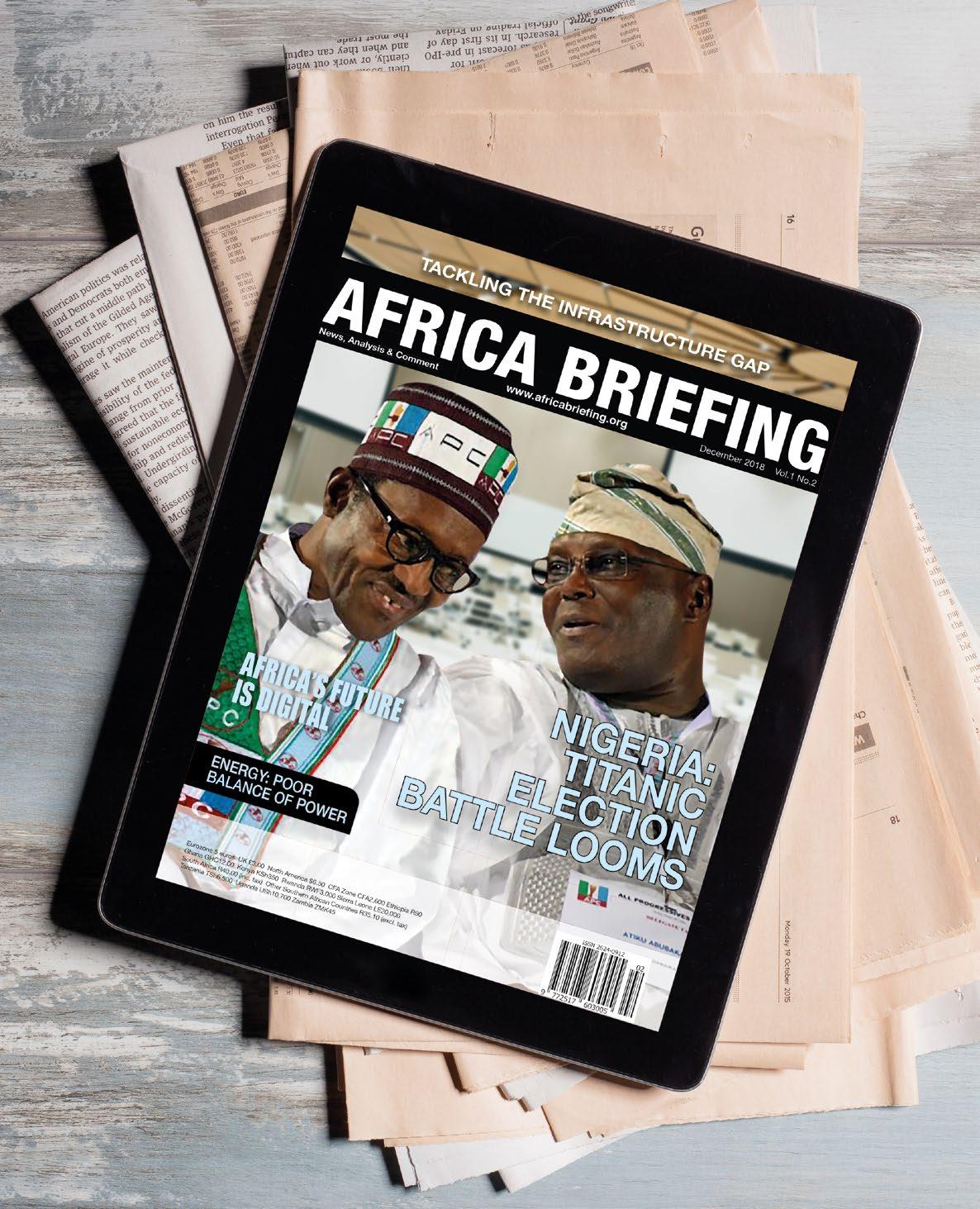










AMID many uncertainties, Nigeria’s 2023 presidential election will surely bring a change in leadership, as President Muhammadu Buhari completes his second and last term in office. Multiple crises await his successor: a contested political system, inflation, high rates of youth unemployment, violent conflict, terrorism and food insecurity. Given Nigeria’s regional influence and booming population, the extent to which the next administration will be able to pave the way to growth, security and stabilisation will have farreaching consequences for all of West Africa.
Nigeria is a mosaic of nations with different geographic, economic, ethnic and religious characteristics. Maintaining a unitary state in the face of such diversity has always been a challenge.
Publisher
Jon Offei-Ansah
Editor
Desmond Davies
Contributing Editors
Stephen Williams
Prof. Toyin Falola
Tikum Mbah Azonga
Justice Lee Adoboe
Chief Chuks Iloegbunam Joseph Kayira
Zachary Ochieng Olu Ojewale

Since the return to civilian rule in 1999, power turnover in Nigeria has taken place according to a tacit agreement observed by the country’s two main parties, according to which the presidency and the vice presidency must alternate between the north and the south and also between the six established geopolitical zones. This policy of zoning is designed to ensure that each region and ethnic group has fair access to power. However, as evidenced by the legacy of President Buhari – who is from the state of Katsina in northern Nigeria – political experts see the policy as more about accommodating the ambitions of the political elite than about regional developmental outcomes.
The challenges of the Nigerian economy – the excessive size of the government and its high maintenance costs and limited achievements – are mirrored in the country’s budget. Around 70 percent covers salaries and allowances, while only 30 percent is devoted to capital expenditure. For the past 11 years, 72 percent of the health sector budget has gone to salaries and running costs. The Nigerian economy still depends on oil and is vulnerable to fluctuations in domestic production and global prices. It is also heavily dependent on state handouts. Fuel subsidies in 2022 cost $10 billion. While President Buhari had announced these would be rolled back, the decision was reversed amid inflation and rising fears of unrest.
In 2018, six of the 10 fastest-growing economies in the world were in Africa, according to the World Bank, with Ghana leading the pack. With GDP growth for the continent projected to accelerate to four per cent in 2019 and 4.1 per cent in 2020, Africa’s economic growth story continues apace. Meanwhile, the World Bank’s 2019 Doing Business Index reveals that five of the 10 most-improved countries are in Africa, and one-third of all reforms recorded globally were in sub-Saharan Africa.
Jon Offei-Ansah Publisher Desmond Davies Editor Angela Cobbinah Deputy Editor
Contributing Editor
Stephen Williams
Oladipo Okubanjo Corinne Soar Kennedy Olilo Gorata Chepete
Designer
Simon Blemadzie
Country Representatives
South Africa
A daunting challenge for decision makers – one that is unlikely to be solved in the coming decades – will be to create adequate conditions that foster growth and job creation so that economic conditions keep pace with demographic growth. This will not be easy, given the structural challenges. After two decades of robust growth, the economy is now stagnant. At less than 1 percent during the past six years, economic growth has been superseded by a demographic expansion rate of 2.6 percent a year.
Michael Orji Director, Special ProjectsEdward Walter Byerley
What makes the story more impressive and heartening is that the growth – projected to be broad-based – is being achieved in a challenging global environment, bucking the trend.
In the Cover Story of this edition, Dr. Hippolyte Fofack, Chief Economist at the African Export-Import Bank (Afreximbank), analyses the factors underpinning this performance. Two factors, in my opinion, stand out in Dr. Hippolyte’s analysis: trade between Africa and China and the intra-African cross-border investment and infrastructure development.
Contributors
Justice Lee Adoboe Chuks Iloegbunam Joseph Kayira Zachary Ochieng Olu Ojewale Oladipo Okubanjo Corinne Soar
Top Dog Media, 5 Ascot Knights 47 Grand National Boulevard Royal Ascot, Milnerton 7441, South Africa
Tel: +27 (0) 21 555 0096 Cell: +27 (0) 81 331 4887 Email: ed@topdog-media.net
Much has been said and written about China’s ever-deepening economic foray into Africa, especially by Western analysts and commentators who have been sounding alarm bells about re-colonisation of Africa, this time by the Chinese. But empirical evidence paints a different picture.
Despite the decelerating global growth environment, trade between Africa and China increased by 14.5 per cent in the first three quarters of 2018, surpassing the growth rate of world trade (11.6 per cent), reflecting the deepening economic dependency between the two major trading partners.
Economists describe the last seven years as having been characterised by a “command and control” approach to economic management based on excessive regulation, high levels of public spending, import substitution, subsidies and welfare programmes. Key indicators suggest that “neo-Buharism” has largely failed. Since 2015, both internal and external debt substantially increased, with the debt stock rising from $28 billion to $72 billion. The unemployment rate quadrupled to 33 percent, making Nigeria one of the worst performers in the world, while the underemployment rate is estimated at 22.8 percent. In June 2022, inflation stood at 18.6 percent. Nigeria’s next president will inherit a dire economic situation. A pressing matter will be to address the growing debt. Amid a global recession and with significant borrowing from China and commercial creditors, debt restructuring will be an arduous task.
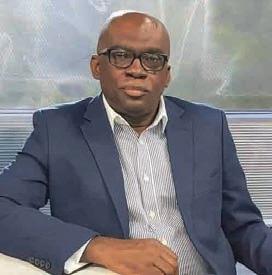 Gloria Ansah Designer
Gloria Ansah Designer
Ghana
Nana Asiama Bekoe Kingdom Concept Co. Tel: +233 243 393 943 / +233 303 967 470 kingsconceptsltd@gmail.com
Empirical evidence shows that China’s domestic investment has become highly linked with economic expansion in Africa. A one percentage point increase in China’s domestic investment growth is associated with an average of 0.6 percentage point increase in overall African exports. And, the expected economic development and trade impact of expanding Chinese investment on resource-rich African countries, especially oil-exporting countries, is even more important.
Reforming Nigeria’s federalism and fixing its struggling economy appear even more daunting considering the security outlook. Terrorist groups such as Boko Haram and the Islamic State West Africa Province remain active in the impoverished northeast of the country and are expanding their operational reach, as evidenced by the attack on the Kuje prison near Abuja. The number of insurgent groups has been rising in Nigeria, reflecting the state’s fragility or absence in many parts of the territory.
South Africa Edward Walter Byerley Top Dog Media, 5 Ascot Knights 47 Grand National Boulevard Royal Ascot, Milnerton 7441, South Africa
Nigeria
The resilience of African economies can also be attributed to growing intra-African cross-border investment and infrastructure development. A combination of the two factors is accelerating the process of structural transformation in a continent where industrial output and services account for a growing share of GDP. African corporations and industrialists which are expanding their industrial footprint across Africa and globally are leading the diversification from agriculture into higher value goods in manufacturing and service sectors. These industrial champions are carrying out transcontinental operations, with investment holdings around the globe, with a strong presence in Europe and Pacific Asia, together account for more than 75 per cent of their combined activities outside Africa.
Tel: +27 (0) 21 555 0096 Cell: +27 (0) 81 331 4887 Email: ed@topdog-media.net
Ghana
Nigerian security forces are under-equipped and lack effective leadership. They are often accused of corruption and human rights abuses, making them ill-suited to address the challenges described above.
The extent to which the next administration will fail or succeed in tackling each of these challenges matters well beyond Nigeria. If the country remains trapped in a vicious cycle of poverty and violence, it will negatively affect the entire West African region. Moreover, with a population expected to double in size and reach 400 million by 2050 and 40 percent of Nigerians living below the poverty line, Nigeria is the most populous country in the world’s most impoverished region.
A survey of 30 leading emerging African corporations with global footprints and combined revenue of more than $118 billion shows that they are active in several industries, including manufacturing (e.g., Dangote Industries), basic materials, telecommunications (e.g., Econet, Safaricom), finance (e.g., Ecobank) and oil and gas. In addition to mitigating risks highly correlated with African economies, these emerging African global corporations are accelerating the diversification of sources of growth and reducing the exposure of countries to adverse commodity terms of trade.
Nnenna Ogbu #4 Babatunde Oduse crescent Isheri Olowora - Isheri Berger, Lagos Tel: +234 803 670 4879 getnnenna.ogbu@gmail.com
Nana Asiama Bekoe Kingdom Concept Co. Tel: +233 243 393 943 / +233 303 967 470 kingsconceptsltd@gmail.com
Nigeria
Taiwo Adedoyin MV Noble, Press House, 3rd Floor 27 Acme Road, Ogba, Ikeja, Lagos Tel: +234 806 291 7100 taiadedoyin52@gmail.com
Kenya Patrick Mwangi
Aquarius Media Ltd, PO Box 10668-11000 Nairobi, Kenya Tel: 0720 391 546/0773 35 41 Email: mwangi@aquariusmedia.co.ke
This makes me very bullish about Africa!
Despite the differences between the three leading candidates, the incumbent APC’s Bola Tinubu, PDP’s Atiku Abubakar and Labour Party's Peter Obi, the next president is expected to adopt a less centralised approach to the economy and more business-friendly policies. Regardless of the winner, the challenges ahead are such that even under a best-case scenario, it will take several more years to reap the benefits of reform.
Kenya Naima Farah Room 22, 2nd Floor West Wing Royal Square, Ngong Road, Nairobi Tel: +254 729 381 561 naimafarah_m@yahoo.com Africa Briefing Ltd 2 Redruth Close, London N22 8RN United Kingdom Tel: +44 (0) 208 888 6693
©Africa Briefing Ltd
2 Redruth Close, London N22 8RN United Kingdom
Tel: +44 (0) 208 888 6693 publisher@africabriefing.org
The contradictions in USAfrica relations
Africa must now make the most of its natural resources
Nigerian elections 2023: sobering fact for voters

There are the expectants of change and there are also those who expect money to change hands, with the multi-dimensionally poor electorate — which has been suffering in the last eight years — choosing the highest bidder for the votes, writes Toyin Falola who says this should not be passed as an impossible phenomenon, seeing as the emergence of two of the three frontrunners was founded on grand vote-buying during the primaries of their various parties
Election 2023: the leading candidates
Nigeria’s February 25 presidential elections are anticipated to be one of the hotly-contested in the country’s recent political history. Africa Briefing’s Lagos Correspondent, Olu Ojewale, profiles the three leading contenders
Although the slogan Never Again was coined by staff of the Truth Commission to reinforce the need for better freedoms in the post-Yahya Jammeh era, Baba Galleh Jallow would now like the government to adopt this as official policy to strengthen the concept
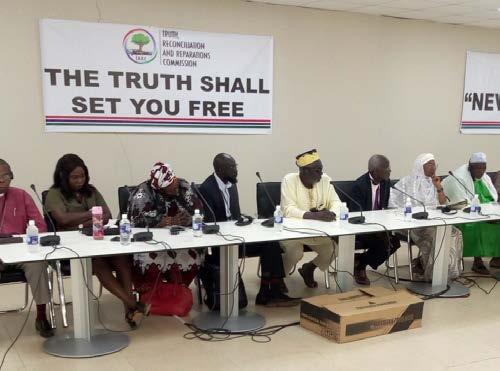
2023 is likely to bring several challenges for the African region, but beyond the headlines of bad politics, Africans will continue with “business-as-usual” innovating and designing products that respond to the challenges, Agnes Gitau writes
The way forward for human rights and rule of law in The Gambia Europe’s energy switch may boost African producers
As Europe shuns Russian energy supplies, Africa is poised to increase its oil and natural gas exports to the continent, writes Teresa Nogueira Pinto
In the final part of a report on East African ports, boutique business advisory firm GBS Africa looks at Tanzania’s race to challenge Kenya’s ports market share and Mozambique’s gas-fuelled economic boom driving shipping demand
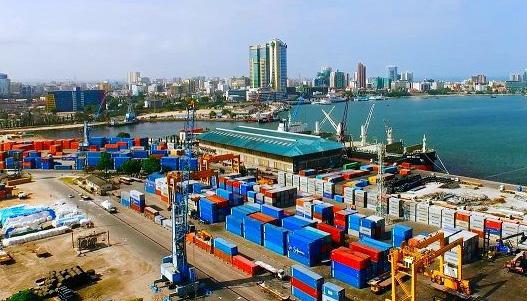
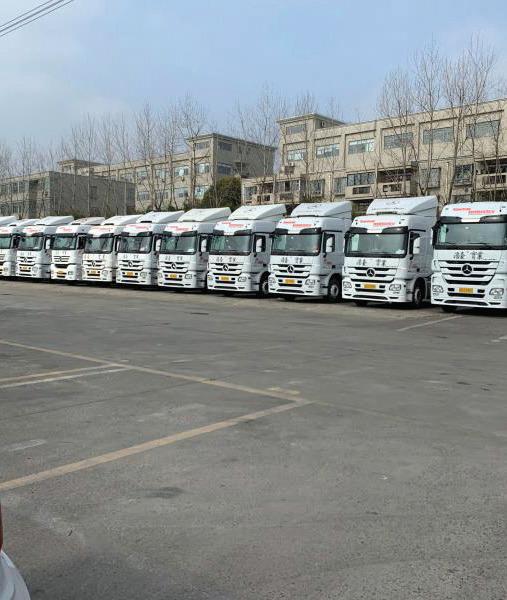
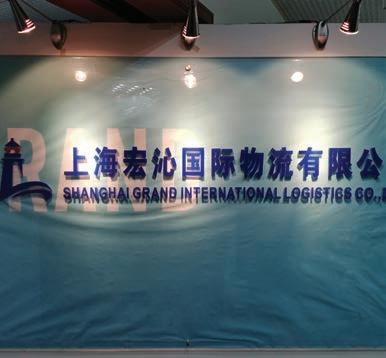
Established in 2002, Shanghai Grand International Co., Ltd. offers a variety of shipping and transportation options via air, sea and ground. Our company is based in Shanghai, China, with branches across the nation. Ranging from customs declaration, warehouse storage, containers and consolidated cargo shipping we have a large array of options to meet your needs.
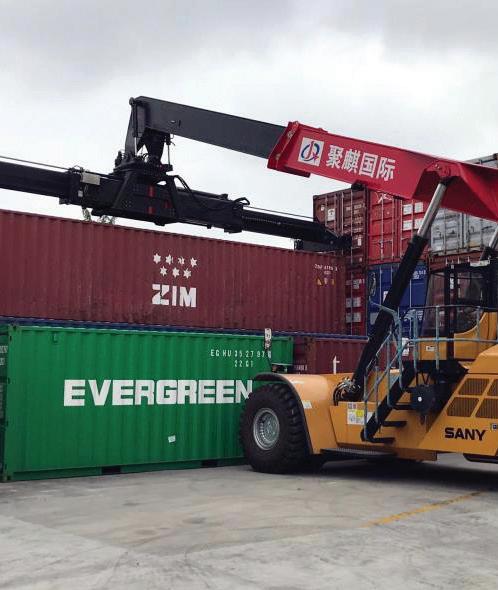
In addition to being approved and designated by the Ministry of Transportation of China as a First Class cargo service provider, we have also established excellent business relations with major shipping companies including Maersk, CMA, ONE, SM line, and
EMC over the past 15 years. In addition we have also built long term business relations with major airline cargo departments. In order to expand our global operation, we are looking for international partnerships to work together in this industry.
Should you ever import any goods from Peoples Republic of China please ask your exporter and shipper to contact us. We will provide our best service to you.
Room 814, 578 Tian Bao Lu, Shanghai, Peoples Republic of China E-Mail: felix@grand-log.net phone: 86-13501786280
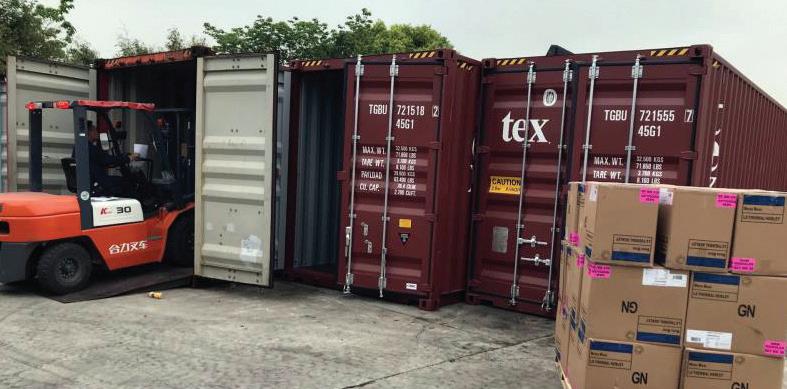 Mr, Felix Ji
Mr, Felix Ji
THE US-Africa Leaders Summit in Washington in December was a momentous one: the Democratic administration of President Joe Biden made quite a number of pronouncements and promises on relations between the US and Africa that have not been made for some while.
There was a new drive in the manner in which Washington wants to see its relationship with African countries progresses. Partnership, according to American officials, is currently at the heart of Biden’s strategy for Africa.
Leading the American side, the US Secretary of State, Antony Blinken, said of these partnerships: “They are actual solutions to some of the toughest and most important challenges that we face and that we have to face as a global community. They’re also critical for increasing trade and investment between the United States and African nations to the benefit of all of us…
“To try to accelerate that progress, the administration is taking a number of steps, including advocating for American business, driving US private sector investment to growth industries in Africa, correcting misperceptions about risk, and working with African partners to strengthen the business climate in their countries.”
He stressed the obvious: “Africa is a major geopolitical force. It’s one that has shaped our past, it’s shaping our present, and it will shape our future”.
We say that he stressed the obvious because all what he said was not platitudinous. It is just that African leaders do not appear to realise how important the continent is globally; instead, they expect the rest of the world to mollycoddle them. That is not the way of the world. Once you realise how powerful or important your country is, leaders should capitalise on this.
Of course, Blinken’s enthusiasm for Africa could be founded on the manner in which the Chinese have bulldozed their way into Africa, elbowing out the continent’s traditional economic partners.
Thus. the US wants to make a strong comeback, which is understandable. And there is a lot of benefit that African
governments can garner from US economic involvement in their countries. Unlike China, which brings in its own employees to run its enterprises in Africa, American businesses provide lots of employment for Africans.
So, America’s rekindled interest in Africa is all well and good. But there are clear contradictions in the renewed USAfrica relations.
For instance, what about the socioeconomic state of the 40-odd million American citizens whose antecedents are inextricably linked with Africa? For over 500 years, they have had to fight every step of the way for their well-being in the US.
African independence in the 1960s galvanised the US Civil Rights movement that eventually led to laws that outlawed
A recent report by RAND Corporation researchers showed that compared with African Americans, white Americans make 73 per cent more in annual income, are about two times more likely to own their home, hold 10 times more wealth, and are 28 times more likely to become millionaires.
The authors concluded that a “historic intervention” in the form of targeted wealth-allocation policies – reparations –could address the problem. They noted: “But truly eliminating the racial wealth gap would only be possible through broader policies that reduce overall wealth inequality in America.”
One important thing that has emerged from this renewed American interest in Africa, is the visit this January to Gorée Island in Senegal by US Treasury
‘ ’
racial discrimination in workplaces, voting and housing. But almost 50 years later, African Americans are still battling for equal rights and justice.
While US diplomats espouse these virtues in their African posts, urging African leaders to follow these principles, African Americans are still being deprived of these basic human rights.
Take, for example, the extrajudicial killings by the police of African American men. George Floyd was brutally murdered by a white male police officer on May 25, 2020: Africa Day.
Now, with the African Diaspora being the sixth region of the African Union, we would have expected African leaders to berate America’s political leaders for this atrocity. It was ordinary Africans who have been raising their voices against such injustice in the US and Africa.
African Americans have a long way to go in order to achieve parity in the US.
Secretary Janet Yellen. The Island, with its Door of No Return for captured African slaves, is one of the most recognised symbols of the horrors of the Atlantic slave trade that trapped tens of millions of Africans in bondage for generations.
“Gorée and the trans-Atlantic slave trade are not just a part of African history. They are a part of American history as well,” Yellen said. “We know that the tragedy did not stop with the generation of humans taken from here.
“Even after slavery was abolished, Black Americans – many of whom can trace their descendance through ports like this across Africa – were denied the rights and freedoms promised to them under our Constitution.”
It is about time the US recognises these contradictions in its relationship with Africa and make life better for African Americans.
ONE of the outcomes of the recent US-Africa Leaders Summit in Washington, which might have slipped under the radar, was a Memorandum of Understanding the US signed with the Democratic Republic of Congo and Zambia. This significant event is for the US to support these two resources-rich countries to develop a joint supply chain for batteries for electric vehicles, money-spinners of the future.
This makes sense. After all, the DRC produces more than 70 per cent of the world’s cobalt while Zambia is the world’s sixth-largest copper producer, and the second largest cobalt producer in Africa. As the signatories note, these resources are crucial components that are urgently needed for the global energy transition.
A US State Department spokesman notes: “The plan to develop an electric battery supply chain opens the door for open and transparent investment to build value-added and sustainable industry in Africa and creating a just energy transition for workers and local communities.
the world, while the continent depends mainly on more expensive imports of goods that are actually made from the exported natural resources in the first place. Focusing on raw materials exports without adding value to these priceless commodities has led to African countries being short-changed over the years.
There now has to be a sea change in the manner in which Africa’s elites are facilitating the land grabs, and crooked mining, logging and fisheries contracts on the continent in connivance with multinational companies and rogue businessmen. Is it any wonder that whenever there is a change of government in an African country, you inevitably hear of mining and other contracts relating to commodities being abrogated because the initial deals were legally flawed?
Over the last few years, the courts in the UK have been awash with litigations involving foreign companies and African governments arguing over the legitimacy of such deals. There are too many such murky business deals that are hamstringing
sort of disadvantage that their countries face when it comes to maximising their natural and agricultural resources. Look at the chocolate industry. It is worth around $130 billion annually, but Ghanaian and Ivorian cocoa farmers get only six per cent of the profit. Obed Owusu-Addai, a campaigner at EcoCare Ghana, notes ruefully: “We think it is unfair. We think it’s about time we began talking about pricing as the most important issue when it comes to cocoa sustainability.”
Pricing, indeed. The Ghanaian government could soon find itself in a bind over its plans to buy oil with gold to conserve its ever-dwindling US dollar reserves. Although this does not involve any physical transfer of cash, such an arrangement requires both sides to value the products to have a fair exchange price.

This will involve fixing the prices for the commodities to be exchanged in the same US dollar or third currency, depending on which currency the supplier chooses. There is an extension beyond the simple exchange, whereby one party will further sell the goods received for liquid cash.
The US private sector is a tremendous resource, both for technical knowledge and financing, for commercial development at every step in the process.”
Crucially, the MoU says the US government will work with the DRC and Zambia “to ensure the private sector has a level playing field to participate in these projects”. The US will also help both countries in their aim of “building a productive supply chain, from the mine to the assembly line, while also committing to respect international standards to prevent, detect, and take legal action to fight corruption throughout this process”.
African countries have been perennial providers of raw materials to the rest of
Africa’s economic progress.
In their book, The World for Sale, Javier Blas and Jack Farchy reveal some of the dodgy deals that are hatched by rogue traders in conjunction with their African facilitators who invariably ask for “facilitation fees”. They write: “The cocktail of big money, strategically important resources and a willingness to operate where others fear to set foot has provided no shortage of opportunities for skulduggery among the less scrupulous members of the commodity trading community. That’s largely been possible thanks to a remarkable lack of regulation or government scrutiny of their activities.”
African governments need to end this
A former London-based banker friend of mine explains: “In the case of Ghana, the government will have its gold valued by weight and the value fixed on the day’s strike price. The other party will match the value of the commodity it has, based on world market prices or some negotiated value base.
“Invariably both sides will use the prevailing world market price that is obtained on the day of exchange. But the big question is: who fixes gold prices? Not the Ghanaian government, as we’ve seen with the row over cocoa pricing. So, this deal could go either way.”
In all this, there are African lawyers and financial experts who are doing well in the US and Europe. But will African governments turn to them to help? I don’t think so.
Thus, problems over adding value to commodities, and litigations involving suspect contracts in Africa will continue.
‘ ’

BOLA Ahmed Tinubu is – of the 18 candidates in the February 25, 2023 presidential election – the least deserving of the exulted office. His candidacy is, to be charitable, an affront on decent political sensibilities all sides of the world. Yet, he trends in the media more than all other aspiring tenants of Aso Rock. Why?
The answer lies at the heart of this column. Tinubu, for all the baggage that makes him unworthy of leadership, is proficient at media manipulation. That, and the absence of discrimination among the enlightened that should lead the masses, explains why dilettantism has commandeered Nigeria’s political theatre. As a corollary, subterfuge and euphemism are in ascent.
Many things forever stood established. Bola Ahmed Tinubu happens NOT to be the real name of the APC presidential candidate. The guy claimed to have attended a primary school that never existed. Files from the secondary school he mentioned as his alma mater hold records neither of his admission nor his studentship. Deloitte in the United States, the accounting firm he posted as his former employer, discountenanced the claim. His year of birth, which he put at 1952, is the subject of impassioned contestation. He was the bloke that gave two fingers to the proponents of religious sensitivity in national politics.
Nowhere else in the world, certainly not in traditional African society, would a man burdened by this crushed backbone of consolidated negatives dare to seek elective office. But Tinubu, the BAT, has had the nerve and the sense of entitlement to announce and reiterate that the Nigerian presidency was his inalienable right. Astonishingly, a multitude of voices is hectoring its agreement.
The stench of fart presages the taste of excrement. When Tinubu orchestrated through mass communication a national swindle that began in 2014, most Nigerians were not attuned to the insidious poison of social media manipulation. For this, Muhammadu Buhari was sold as the only Nigerian capable of extricating the country from the depths of the political mire.
with his impatient swansong of retiring to Daura. After a remorseless record of nation wrecking that includes the devastation of the national economy – petrol now sells above N300 a litre, up from N87 when he showed up – Buhari has warned that his “legacy” deserves continuation through a Tinubu presidency!
Professors swooned at the spectacular advertising. Professionals, trade unionists, journalists, students, traders and, indeed, all comers caught the bug.
Before long, the proclaimed redeemer proved duplicitous. Months away from vacating Aso Rock, Buhari has in capital letters written MERETRICIOUS as his middle name. He is the General unable to tame the fire of insurgency. He is the clean leader under whose watch corruption attained the zenith of impunity. He is the exemplar of nepotism as the finest attribute of nationalism. Yet, he does not have a bad press. Despite the gross human rights abuses of his presidency, like the massacring in a single day of 300 Shiites in Zaria on December 12, 2015, he is currently entertaining court revellers
BAT knew that to subjugate a people, its media must be emasculated. This is how he played it. From the depths of his opulence, he set up a TV station, a national newspaper, a couple of radio stations, and a division of “Internet Consultants”. Additionally, he besieged “independent” media operators and persuaded many of them to see “reason”. Thus, if a reasoned argument is published, demanding that Buhari should condemn, punish and reverse the tide of his ethnic Fulani people terrorising all six geopolitical zones of the country, 2000 Internet Consultants would rise in opposition.
With this media shroud, Buhari was shielded from being accountable to the people. He never saw a good enough reason for routine engagement
‘ ’
with Nigerians. Since assuming office in 2015, only once did he host the monthly Presidential Meet The Press programme fashioned and sustained by his predecessors! He burnt up 200 days receiving treatment in British hospitals, without considering it the right of his subjects to know what ailed him and the amount of their money tossed into his medical bills.
Every December 17, which is Buhari’s birthday, Tinubu will unleash a tribute, eulogising the man’s incomparability. Last year, he said the following on him: “Through your careful leadership and measured governance of our great nation, your administration has achieved many things for which we can rightfully be proud.” He failed to mention even one of the spellbinding achievements. But, as sure as the snail caries its shell, his Internet Consultants hit the country with a thousand voices, disseminating the flagrant encomiums. Still, that is not even where the problem “makpus”! To get it, Nigerians must return to April 10, 1985. On that day, Major General Muhammadu Buhari’s military junta executed Bernard Ogendegbe (29), Lawal Ojuolape (30), and Bartholomew Owoh (26), for hard drugs offences. The crimes for which the trio faced the firing squad were committed before Buhari seized power on December 31, 1983. Back then, the crimes carried penalties no more severe than fines and short-term imprisonments. But they faced the firing squad on account of the retroactive strength on Buhari’s Decree 20.
An argument in support of the loathsome measure is that it underlined Buhari’s visceral antipathy for hard drug peddling. This raises a fundamental question: How come that Buhari, whose junta amputated the tenets of natural justice to end three young lives, is today championing the electoral cause of a man unquestionably tainted by the scandal of hard drug offences? It is a matter of public record that, in 1992, Tinubu was indicted in the United States for laundering funds straight out of heroin deals. While earning less than $2,400 a month, he banked within a short space of time several millions in various accounts in the Chicago metropolis. Smart guy, he plea-bargained and forfeited $460,000 to American authorities. Should that prevent a careful leader of a measured government of multiple achievements from showing
There is the health issue. But, to begin with the moral one. If a journalist weighed down by years of rent arrears suddenly finds that a stupendously rich politician has gifted him a tastefully furnished mansion, would that be justification for that member of the Fourth Estate of the Realm to mount the rooftops screaming endlessly that a politician sick unto death is the best candidate to assume leadership of a country sick unto death? On this health question, Buhari and Tinubu are passengers in different jalopies. Before he became President, Buhari’s fragile health was not common knowledge. In Tinubu’s case, the world knows that he groans under a welter of serious health challenges. His limbs quake uncontrollably. Speaking, his sentences, even in their sparseness, are laced with gaffes and incoherence. He fields no questions. He dares not speak off-the-cuff. He does not engage in debates, not even with other presidential candidates.
Tinubu recently contrived a trip to London’s Chatham House. But when questions designed to shed light on his presidential ambition surfaced, he farmed them out to fawning aides, prompting his Internet Consultants into the tongue-incheek explanation that the expediency was a highpoint of teamwork. He goes to meetings; he falls promptly into fitful slumber. He gets off a sitting position
would be added to his media stranglehold, together with all Federal radio stations in Abuja and the 36 states of the Federation. To these awesome absolutes add the command and control of the disciplined forces and the country would plummet to the uncontrollable and extra-constitutional morass of an Imperial Presidency.
Now, how does one avert the leviathan? Nigerian youths have proffered the answer by clamouring for a new deal. They realise that the campaigns are all but over. But they must be disturbed by the stridency with which people unfit to govern have claimed victory in a yet to be conducted election. The youths know that a free, fair and credible presidential ballot is the only route to Nigeria’s salvation. The tremendous thing about them is their rejection of the old order that includes PDP’s presidential candidate Atiku Abubakar. The youths are sick and tired of the interminable strikes by university teachers. They are fed up to the hairline with the incessant bloodbaths in places of worship, in villages, in townships, on farmlands.
According to the Independent National Electoral Commission (INEC), people under 50 years constitute 75.4 percent of registered voters. Tomorrow belongs to this powerful demographic and it should stand between elections and practised riggers. INEC can help this group’s resolve by writing into its Bimodal
and the wetness of his agbada points to incontinence. Yet the battalions and brigades of his media division shout with a trillion voices that the man is the healthiest specimen alive, the best man to lead Nigeria to Eldorado.
Dig this: Without the levers of political mandate, the BAT has for years held a broad swathe of the nation’s media in thrall. As president, all NTA stations in Abuja and the 36 states of the Federation
Voter Accreditation System (BVAS) a programme that automatically invalidates any voter thumbprint thrown up more than once in an election. This is not difficult. Any brilliant 200 Level computer major will write the programme in hours. The Federal Road Safety Corps (FRSC) has been using a similar App for decades, readily detecting any human face applying for more than one driver’s licence.
AS everyone all over the world welcomed the year 2023, and even in the rejoicing Nigerians expressed at the turn of the year, there is the underlying and sobering fact that 2023 is the 109th year since the amalgamation that birthed the Nigerian state. In the same vein, this year marks the 63rd year that Nigeria gained its independence from British colonial rule.
When we begin to view the new year from these two lenses — especially since this is yet another election year for Nigeria — it sets the mood for reflective thinking
as a nation what progress the country has made, and whether Nigerians truly have a potentially better and more progressive future together as a people.
On February 25, the election for the next president and members of the National Assembly will take place. As each day passes, so is the realisation that one of 18 contestants, or more realistically, one of the three frontrunners, will emerge as the successor to President Muhammadu Buhari.
There have been some changes in the build-up to this election — the most
notable being that for the first time since the 1979 election, Nigeria has three frontrunners for the presidential seat. The first time something similar happened was in 1959, when the electoral and political formation of the country was too regionalised.

This was largely owed to the fact that the country had, through the Arthur Richards Constitution of 1946, been divided into three regions. Bernard Bourdillon, who saw to the official recognition of three regions in the country — the Eastern, Western, and Northern
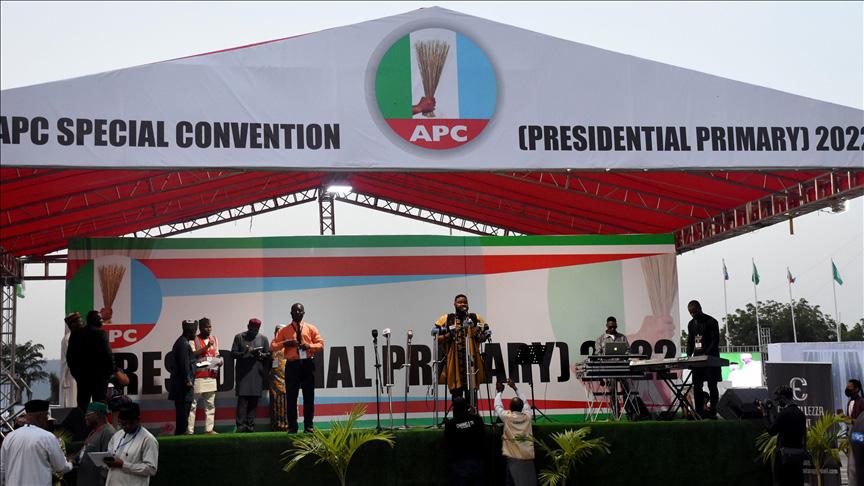
There are the expectants of change and there are also those who expect money to change hands, with the multi-dimensionally poor electorate — which has been suffering in the last eight years — choosing the highest bidder for the votes, writes Toyin Falola who says this should not be passed as an impossible phenomenon, seeing as the emergence of two of the three frontrunners was founded on grand vote-buying during the primaries of their various parties
regions — sought to administer Nigeria in a way that allowed the different peoples of the country to participate while also tailoring governance to suit the realities of the different regions.
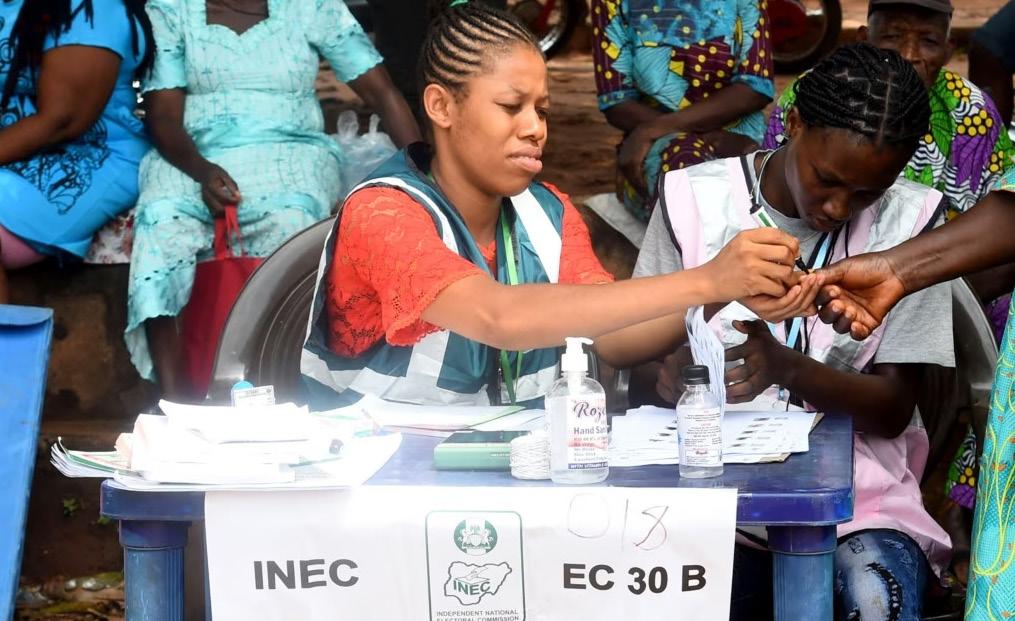
While this could have been a somewhat people-centric move in itself — especially since the ushering in of the Richards Constitution was in response to the clamouring of Nigerian activists on the defects of the Clifford Constitution — the regionalisation of Nigeria at that point, when there was little to nothing that served as the elements of the Nigerian identity, set the course for the cauldron of national crises that the country is in today.
Administering the regions according to ethno-specific differences meant that the realities of the Nigerian people continued to widen in differences along ethnic lines. Therefore, when the time came to elect national leaders close to the end of colonial rule, the compartmentalisation kicked into full gear.
Independence agitation morphed into a regional tussle for central power among the three prominent ethnic groups. There was the Action Group (AG) — founded and led by Obafemi Awolowo of the Yoruba major ethnic group. The bulk of the support AG
received was from the Yoruba people.
There was the National Council of Nigeria and the Cameroons, which
fronted as nationalist political parties with ideologies founded on nationalism and progressivism, their political campaigns,
later became the National Convention of Nigerian Citizens (NCNC). Although founded by Herbert Macaulay of Yoruba descent, the bulk of the support and membership of this group came from the major Igbo ethnic group. It also fielded Nnamdi Azikiwe as its presidential candidate in the 1959 election.

The third party was the Northern Peoples’ Congress (NPC), which was the only party that did not reflect nationalistic ideals from the outset. As is reflected in the name, this was a strictly Northern affair and the party produced Tafawa Balewa, the country’s first Prime Minister.
Although the AG and the NCNC
affiliations, and mantras soon betrayed ethnic and regional tendencies in the leadership and administration of these parties.
Déjà vu. In 1979, when Nigeria had gone through the turmoil of a destabilising and dehumanising civil war alongside 13 years of unstable military rule that brought about several usurpations and toppling, the country was yet again ready to switch to democratic rule. But if anything, the 19 years that had elapsed since its independence had done more rupturing to the fibre of Nigerian nationalism, creating citizens who firmly believe they have little to nothing in common with those in other regions of the country.
‘ ’
Thus, the presidential election of 1979 saw a repetition of the ethno-regional political and electoral formation of 1959. There was the National Party of Nigeria (NPN) whose formation had its roots in meetings among the leading and influential leaders of Northern Nigeria in the late 1960s to early 1970s. Although fronted with a name that reflected national affinity,
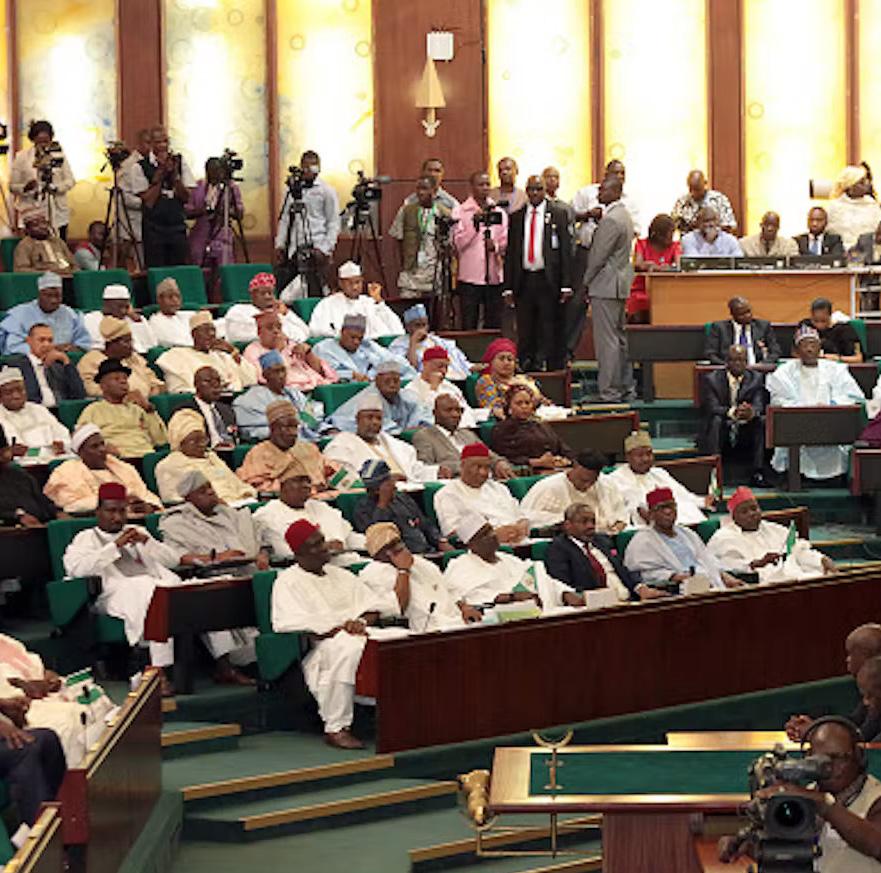
the party was but a regional party majorly supported by Northern Nigeria and it fielded Shehu Shagari as its candidate.
Awolowo’s Unity Party of Nigeria (UPN), which he founded just a year before the election, was primarily a rechristening of the old AG of the first republic. Like the NPN, the UPN took on a name that reflected Nigerianness and
nationalism, but like the defunct AG, the party’s membership base and strongholds were mainly in the Western part of the country. As expected, the presidential candidate the party fielded was Yoruba — Awolowo himself.
The Nigerian Peoples’ Party (NPP), which took on a nationalist christening like the other two parties and in fact

was the only party of the three to set off as predominantly nationalistic in the formation of its members — as it had foundation members from the three regions of the country — soon became a major Eastern party.
It further cemented its Easternness by fielding Azikiwe as its presidential candidate. And thus, again, began an
ethnicity-fuelled tussle to take national power and control. This tussle ended up favouring Shagari and his North-populated NPN, which won the majority seats in the parliamentary and presidential elections.
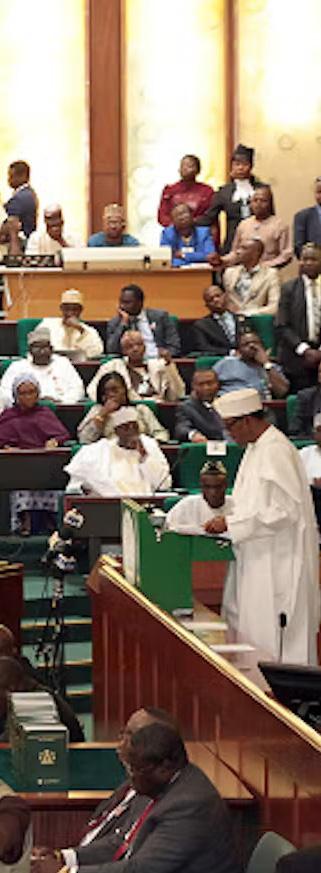
History is not only for recounting or recollection. Beyond those two cases, history also serves as a useful way of drawing patterns and charting a better course for more beneficial outcomes that will serve the good of all or the majority. The build up to the 2023 presidential election has taken a similar shape to what happened in 1959 and 1979.
We have three frontrunners yet again: Bola Ahmed Tinubu of the All Progressives Congress (APC), Atiku Abubakar of the Peoples’ Democratic Party (PDP) and Peter Obi of the Labour Party. The key difference between the 1959 and 1979 electoral and political formations is that politics in today’s Nigeria — especially among the political parties — is not necessarily ethnicity-based.
However, there is no denying that ethno-religious factors remain the strongest moving force for political choice in Nigeria. This is largely due to the fact that the average Nigerian is more Yoruba, Ibibio, Hausa, Efik, or Igbo — you name that ethnic group — than they are Nigerian.
The supersizing of ethnic identity over national identity also influences the affiliations and alignments that happen among Nigerian political parties, their leaders, and flagbearers.

Toward the 2023 elections, the first and chief consideration among the contestants is to position themselves in a way that aligns with the biases of the ethno-religious groups and sects more than the other candidates. And this alignment is often in favour of the North — since according to voting history, Northern Nigeria mostly records the highest registered voters to voter participation ratio.
For instance, Tinubu’s selection of Kasim Shettima as running mate goes far beyond the surface-level justification presented on Shettima’s competence. It is rather a strategic ploy that will position him as the candidate of choice among the more religiously tolerant but ethnically biased Yoruba.
They would be more willing to support a candidate of their ethnic group regardless of the religion, while also earning him enough political stronghold in the ethno-
religiously biased Northern Nigeria where the majority of voters will not only want to see a Northerner representing them before they give their support, but will also seek to support based on religious affinity.
Thus, even in the face of heightened religious triggers in the country, the ruling party is fielding a Muslim-Muslim ticket, a bold move that does not sit well with some, but is the most politically feasible if Tinubu were to win.
Even Obi, who is considered largely a third-force candidate and whose candidacy is propelled by the majority of the youth and an emerging non-party-based voter affiliation, has some elements of pandering to electorate bias, seeing as he selected his running mate from the core Northern Muslim population.
The strategic affiliations of presidential candidates in Nigeria are as a result of the constitutional binding that requires the emerging winner to not only have the highest number of votes, but also win 25 per cent of votes in each of the six geopolitical zones of the country.
The build up to the 2023 elections has largely followed the pattern of previous elections in the country. First of note is the poor quality of voter engagement among the leading contestants.
Aside from the third-force candidate, Obi, who has made concerted efforts to engage the citizenry beyond the traditional state-to-state campaign rallies, the other two candidates have largely shied away from media engagement, debates, and roundtable discourses aimed at engaging candidates on topical issues related to the office of the presidency and what the aspirant is likely to face in government.
On the aspect of citizen engagement, Tinubu has performed the poorest, often sending aides or his aspiring Vice to represent him at such events. It begs the question: does the candidate believe himself too important to attend to the questions of the electorate or what is the game plan in making him absent from vital town-engaging events?
For those who would hastily point to the campaign rallies as a good enough means of engaging the electorate, it is important to note that campaign rallies in Nigeria remain a one-sided affair where the candidate will reel out their surface-level promises within minutes, drift to other topics, supplicate the electorate to vote for
them, throw expletives at their opponents, and leave — perhaps distribute money to the attendees — with no real engagement of the listeners or opportunities to ask questions or give assessments of the feasibility of promises made.
The coming of the 2023 elections is also awash with the same campaign strategies that we have seen across decades — candidates being captured in the mosque and at church gatherings to appeal to the religious biases of Nigerians; candidates traveling to the US and the UK to prove that they have a clean track record and are not wanted felons in these countries; glowing promises that lack depth or clear-cut feasibility pathways; and of course, leveraging people who have benefited from the benevolence of the candidates in the past to project their personal benefits as enough reasons that make a candidate qualified to be the president to stabilise Nigeria.
However, there have been some differences on the political front in Nigeria, with media organisations being more conscious of debunking fake news and fact-checking claims from candidates.
The political maladies of Nigeria do not reside with the candidates alone. There is generally lesser attention paid to the contestants for the National Assembly — so much so that many of the contestants easily glide back into office for their second, third, or fourth term. The downside of this is that representation of citizens at the national level is poor, and the people leave law-making, checks and balances, and other legislative duties in the hands of imperious lawmakers who have little to no concern for the development and progress of the country.

The low attention level that is paid to those for the National Assembly, coupled with the electorate’s ignorance
of the power they have to recall or refuse to re-elect a lawmaker, is what fuels the unscrupulous and lackadaisical behaviour of their representatives. A December 2022 analysis by BudgIT Nigeria showed that the National Assembly abused its appropriation powers by inserting 1,522 projects — at a gross cost of N186.61 billion — into the 2022 budget of the Federal Government before approving the budget.
The more shocking detail in the discovery is that the inserted projects were orchestrated in the names of some Assembly members. A case in point is the Speaker of the House of Representatives, Femi Gbajabiamila, who slotted in the construction of blocks of classrooms in secondary schools in Itire-Ikate among such projects as the Nigeria Stored Products Research Institute and the National Centre for Agricultural Mechanisation.
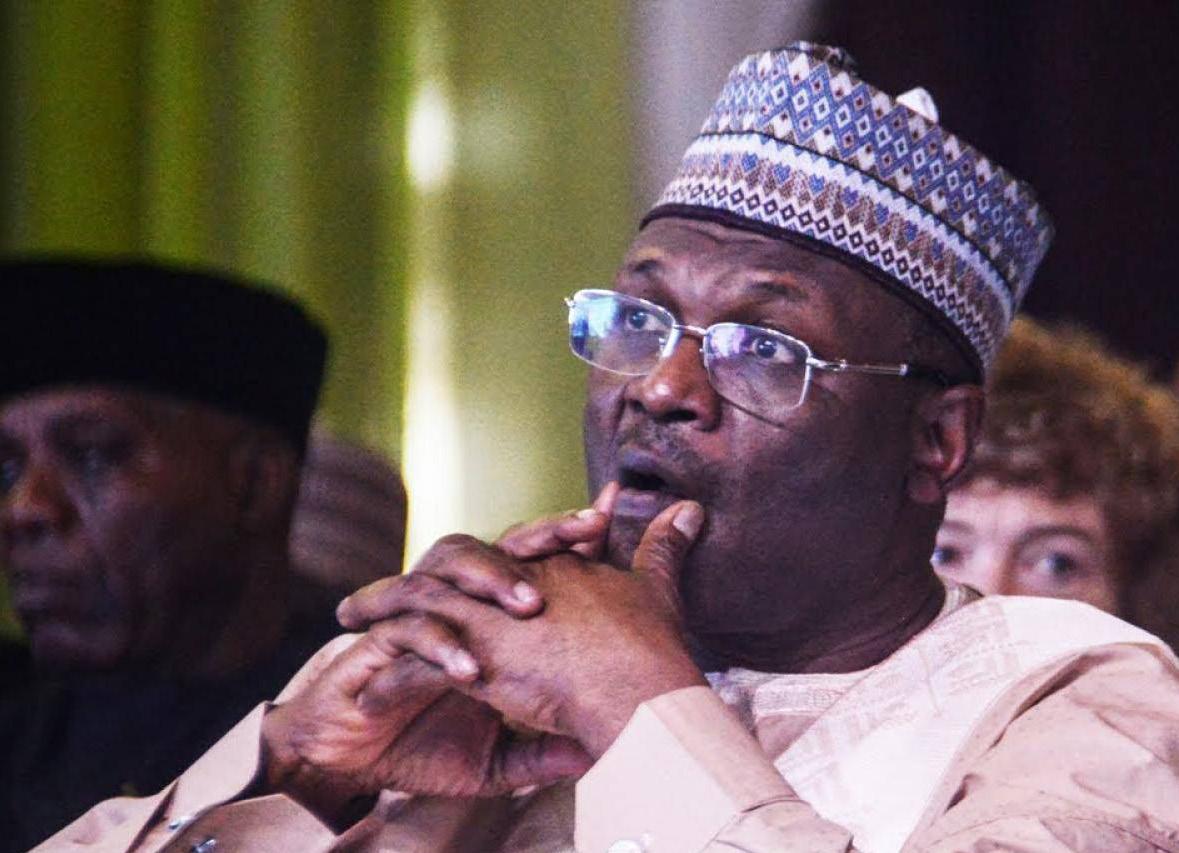
More unscrupulous is that these blocks of classrooms — built at figures blown beyond proportions — were named after him, thus successfully building a personal legacy using public funds. Incidents like this happen often among federal representatives and they almost always escape backlash because the electorate pay little to no attention to the affairs of the National Assembly and the electoral process of the same assembly.
Also, Nigeria’s electoral problems stem from low voter turnout. Since Nigerian elections are touted to be democratic — at least voters are allowed to register and even vote in several parts of the country — the country’s leadership is susceptible to what all other democratic states are also susceptible to. That is, a case where the few citizens who make up the majority of the voters decide the next leaders for the country. With a 37.75 per cent turnout rate in 2019, Buhari garnered the majority of just about one-third of voters who
registered and was elected president of Nigeria.
Why don’t Nigerians vote and why do they register just not to vote? These responses come to the fore: first, the voter’s card has served as a means of identification for Nigerians for quite a long time. Therefore, a good percentage of those who register as voters during every election cycle are not doing that with voting as the end goal, but to get an official means of identification.
However, the percentage of those who do so might reduce drastically in the coming election, as the mass deployment of the National Identity Number has curbed the need for a Voter’s Card as a means of identification in several official and formal capacities.
Secondly, there is a crop of Nigerians with a warped sense of how potent the power of the electorate is in a democracy. Perhaps, we cannot fully blame this category of people, seeing as what Nigeria practices has little semblance to a true democracy.
For this category of people, votes do not count in Nigeria and the election results are always manipulated to suit the small-knitted cabal or the incumbent president. To them, there is no need to register as voters or go through the process of voting since their votes would not count. This category of people greatly contributes to the low voter turnout in Nigeria and is also a large part of why Nigerians get the type of leaders they get, since things are left to chance.
Also in existence is a category of people who practice political apathy. They are either Nigerians who do not believe there is any good politician anywhere in Nigeria and would rather not participate in the electioneering process than vote for any of the contestants, or those who wish to have no political affiliations in the country but would rather raise supplications to God to come to Nigeria’s aid and deliver it from the crop of leaders it has.
Of the category of Nigerians who contribute to the rot in the system by not exercising their franchise are those who believe there is a dedicated pattern that elections in Nigeria follow and that things will always follow that pattern. On their checklist are: electoral violence, vote buying, ballot snatching, voter coercion, voter restriction and manhandling, among other electoral malpractices.
This category is not totally wrong, as Nigeria is still largely buried in electoral malpractices — such as the election-incited shooting that led to the death of Temitope Olatoye, a federal house of representative member from Ibadan, and the competitive vote buying reported at gubernatorial elections in states like Osun and Edo.

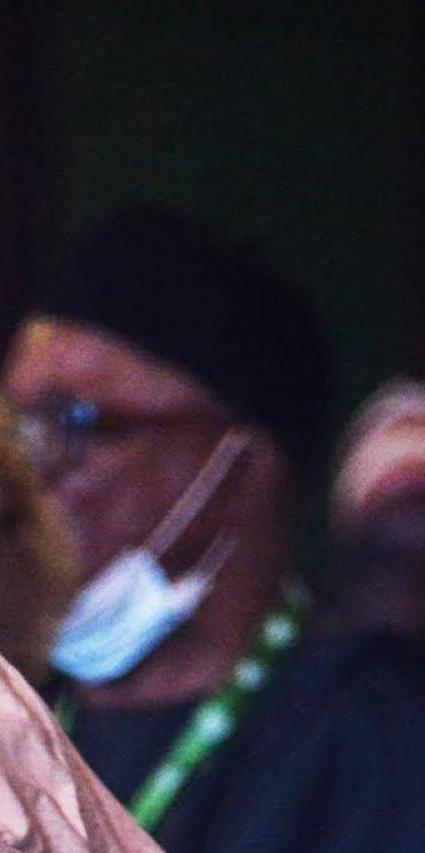
There is a systematically corrupt electioneering pattern in Nigeria, a system these parties bank on to help them win elections. There is a hierarchical allotment of expected deliverables to party loyalists by the big-name parties — from the polling unit level to the ward, the local government, the city, the state, and the national level. The belief that the 2023 elections will be no different from this already-known pattern is what fuels the apathy of many other Nigerians.
Another issue of concern is insecurity in the country. It has heightened, penetrating virtually all the geopolitical zones — from civil unrest and civilian murder in the East, to kidnapping in the West, to terrorist attacks in the North.
Specifically, there have been up to 50 targeted attacks on the offices of Independent National Electoral Commission (INEC) across the country, attacks that are not unrelated to the introduction of real-time polling unit results on the INEC Results Viewing Centre (IReV) and the introduction of the Bimodal Verification and Accreditation System — two innovations expected to curb electoral malpractices and strengthen moves for a free, fair, and credible election.
Due to the targeted attacks serving as a signal and threat to INEC on its mission to conduct a fair election, the body has nursed the thoughts of postponing the election or cancelling it totally, a move that will not bode well for the country and may lead to an unprecedented drop in voter turnout when the election is eventually held.
There are the expectants of change in the coming election in 2023, and there are those who only expect money to change hands, with the multi-dimensionally poor electorate — which has seen more suffering in the last eight years — choosing the highest bidder for the votes. This should not be passed as an impossible phenomenon, seeing as the emergence of two of the three frontrunners was founded on grand vote-buying during the primaries of their various parties.
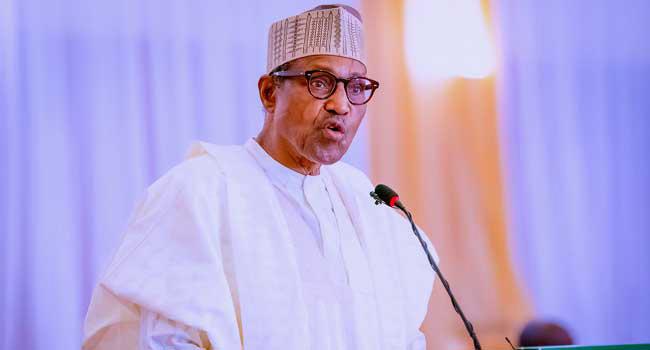
NIGERIA’S outgoing President, Muhammadu Buhari, has cumulatively led the country for 10 years — two as a military head of state, and eight as a democratically elected president. His years of service as Nigeria’s first citizen only fall short of Olusegun Obasanjo’s in length, the latter having served for 11 years — three as a military head of state, and eight as a democratically elected president.

Buhari rode into power for his first tenure as a peoples’ favourite, following the coalition of some parties into the
All Progressives Congress (APC), and fuelled by the anger of the citizens at the laissez-faire attitude of the incumbent Goodluck Ebele Jonathan to the corruption that rocked his tenure and the height of terrorism and unrest in Northern Nigeria.
The emergence of Buhari came with a promise of an immediate and final end to the insecurity, terrorism and civil unrest in the country and a face-down battle with corruption. If the past eight years are anything to go by, the administration of Buhari brought an all-time high in nationwide insecurity, which has not
only stopped at the brazen unrest of Fulani herdsmen, but has also morphed into murders by unknown gunmen, kidnapping and abductions at train stations and on roads, the killing of citizens by rogue policemen, among other cases of insecurity.
Another phenomenon that has dented the administration of Buhari is widespread corruption with unprecedented ridiculousness and clownlike tale-telling and theatricality — ranging from snakes swallowing millions of naira, to monkeys stealing money, the Nigerian National
The administration of Muhammadu Buhari brought an all-time high in nationwide insecurity, which has not only stopped at the brazen unrest of Fulani herdsmen, but has also morphed into murders by unknown gunmen, kidnapping and abductions at train stations and on roads, the killing of citizens by rogue policemen, not to mention widespread corruption, argues Toyin Falola
Petroleum Corporation failing to remit revenue to the coffers of the government in a country where the president also serves as the Petroleum Minister, and the Director-General of a parastatal who fainted during questioning on issues of mismanagement in his agency. What a travesty.
At the heart of these cases of corruption are deep-seated issues of nepotism and impunity, leaving Nigeria in a state of bubbling anarchy, where the guilty have neither been arrested nor prosecuted. The corruption, lack of regard for the electorate and citizens, and disregard for the Constitution during Buhari’s tenure are so commonplace that the sitting Governor of the Central Bank of Nigeria — expected to be a partisan appointee — contested for the presidential ticket of the APC.

As if that were not enough, findings have revealed that key appointments in the current presidency are tailored to reward relatives of the sitting president, a case of nepotism like has never seen before.
The nonchalance of the Buhari administration to the plight of the people and the introduction of people-limiting policies clearly showed the utter disconnect
of the ruling class from the realities of the citizenry. First on this list is the nowinfamous closure of the borders, which lasted for two years, resulting in a crippling of intra-continental trade and sparking a rise in inflation in the country.
Another of such policies is the recent redesign of the naira and an introduction of new withdrawal limits that will only cripple the flow of cash in the economy without obvious gains. And at times that citizens feel the need to engage the leadership of the country or hear from the presidency, the president does a terrible job of not granting them an audience or touching on matters at hand — an attitude that was grossly manifested during the height of the #EndSARS protests of 2020.
As Buhari prepares to step down, his government truly leaves infrastructural
footprints. However, in his wake are gloomy manifestations such as the phased subsidy removal to take effect from June
2023, an all-time highest debt cost of N42.84 trillion, a N10.78 trillion deficit in the 2023 budget, and gross rupturing in the fibre of national oneness, among other issues.

Sadly, true is the fact that a presidency elected to rescue the nation from disunity, corruption and poverty is leaving the same nation probably more disunited, more corrupt, poorer and arguably more religiously and politically polarised than ever in its history.
In the face of all these, Buhari is bent on leaving the legacy of a free and fair election, evident in his signing of the new Electoral Act that ushered in innovations such as financial independence
‘ ’
for the Independent National Electoral Commission (INEC), making it less susceptible to manipulation by the incumbent government; the creation of the Central Electronic Voter Database that will support efforts to make the election transparent, as the electorate can vet to ensure underaged citizens are not registered to vote while also allowing the Commission to prevent unregistered voters from participating in the electoral process.

Furthermore, the innovations of this new Act signed by Buhari include the revision of the meaning of the tribunal definition of over-voting, thereby making it possible for aggrieved persons to present a case of the number of votes cast exceeding the number of registered voters in a polling unit wherever it happens; and also the introduction of the INEC Results Viewing Portal, which will see to the realtime upload of election results and help the electorate follow the trajectory of the election from the outset.
All these point to one fact: Buhari has not shown any interest in influencing the results of the coming election, a point that
he has also proven through his responses to questions asked in public and his counsel to Nigerians to vote for whomever they believe is best for the country.
However, that is not to say that the future holds the best for the president’s successor. It is a brave undertaking to choose to be Nigeria’s president at this point, as the scales are tipped in favour of the emerging candidate failing in the duty, than in winning.
Regardless of the pedigree and antecedents of the person who eventually emerges as Buhari’s successor, and no matter the quality of the team such a person assembles, managing Nigeria in the first few years will not be a walk in the park.
Undoubtedly, it is possible to have brought the nation to a state of stability and readiness for growth by 2027. However, it will take careful considerations and foresighted strategies to arrive there.
It is important to ask what Nigerians want of their incoming leader, as this will, first of all, give insights into what could
possibly be the election results, while also serving as a compass for the emerging leader who will undoubtedly be faced with a Herculean task.
Vital as this question is, the answer is not easy to generate — or simply put. Nigerians do not cohesively and collectively know what they want of their incoming leader.
Nigeria is a state where personal interests supersede any sense of joint or collective national interest, so much so that it is rare for the citizens to have joint wishes from the successor of the Buhari administration.
However, it is important for whoever succeeds Buhari to understand that theirs is a peculiar situation. Aside from inheriting the multi-dimensional woes that the subsidy removal will plunge the nation into — from widespread national protests by the citizens, to the expected hike in production costs and the price of goods and products, to the increase in the cost of services due to the hike in the prices of petrol and diesel — there will also be issues of increasing national debt to battle,
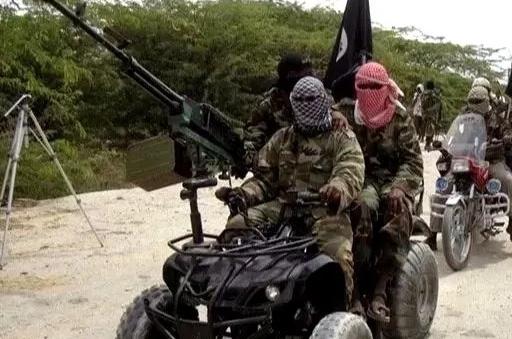
inflation, and the gaping holes of rot that will most likely be uncovered, provided the emergent successor is not from the currently ruling APC.
Chief among the problems the emergent successor will face is the case of a general loss of confidence in the One
the West for the formation of an Odua nation; there have been regional coalitions among governors to form state-run security networks to protect the citizens of the regions; and there is a lot of finger-pointing and counter-accusations on which ethnic group is to be blamed for the collective woes of the country.
Nigeria is currently surviving on a thin thread and the outcome of the 2023 election will be pregnant with prolonged shows of dissatisfaction with the results of the election in at least one of the regions.
It is vital for the emergent leader to read the room, understand that this will most likely happen, and spend the period between the declaration of results in February and the handing over in June to strategize on making what could be the defining point for his administration — efforts to launch a reconsideration of the details of the Nigerian identity, what binds the Nigerian people together, and what defines them.
This reconsideration will require more than a constitution of leaders. It will require more than a review of the Constitution. It will require the leader to be genuinely interested in listening to aggrieved parties, negotiating with the Nigerian people, and factoring ways to make their administration inclusive.

By making a people-centred move their first point of action, the emergent leader will be passing a message to the people that they are ready to change the trajectory of how governance is done in Nigeria.
It is also vital to look into the root causes and underlying factors breeding widespread insecurity in the country.
activities, to breeding fear in the people and a loss of confidence in the country’s leadership.
Furthermore, the emergent leader must put competence before all other factors in selecting the people to work with — neither ethnic, familial, party, nor religious affiliations should precede competence in selecting team members, heads of parastatals, ministers, and other key positions in governance. This is because what Nigeria needs at this point are the best hands to stop the rot, stabilise the system, and prepare the country for development.
Beyond what is possible within the first few years of the coming administration, the emergent successor of Buhari must work toward or at least lay the foundation for the transformation of Nigeria. This should go beyond yet another buzzword like the change mantra that the citizens were sold on in 2015 by the APC. This transformation must rest first on systemic cultural change that washes across the whole country, value reorientation of the Nigerian peoples, and a renegotiation of the Nigerian identity.
Culture as a human concept transcends the material or the immaterial that are commonly mentioned by people. Although on the surface, it looks like there is little to nothing that binds the Nigerian peoples together and that there are little to shared cultural elements, a look into the behaviours of the average Nigerian betrays traits that were passed down for having lived in Nigeria — such as a lack of respect for authority or laws, systemic corruption, and overbearing selfishness, just to mention a few.
These are traits that can be found in the average Nigerian anywhere in the country, even if the Oha soup and the Tuwo Shinkafa have nothing in common. Therefore, the emergent leader must lay the groundwork or start work on the awakening of Nigerians from the state they are in. This must include the discovery of an overarching purpose that Nigerians can aspire to as a unified people.
Nigeria project among the citizens. There is heightened clamouring in the East for a Biafran nation; there are campaigns in
Insecurity needs to be one of the quicklytackled problems in the country as its effects overflow into other aspects of the country, from causing friction in economic
It is only when this has been done that the country will have a sense of unified identity that transcends being Hausa, Igbo, Yoruba, or any other ethnic group. It is a time that development will become the binding force and unifying phenomenon that drives the attitudes, actions and reactions of the Nigerian populace.

It is vital for the emergent leader to read the room and spend the period between the declaration of results in February and the handing over in June to strategize on what could be the defining point for his administration
’
The mass appeal of Peter Obi to the Nigerian youth appears to be paying dividends as he is seen as one of the leading three presidential candidates
PETER Gregory Obi, a former governor of Anambra State in the South East of Nigeria, is no doubt, a front runner in the Nigeria’s presidential race. Since he won the presidential primaries of the Labour Party (LP) last May, Obi’s profile has risen, especially on social media where he seems to be enjoying the support of the large army of netizens. He also has been curing and getting the support of some prominent Nigerians, including former President Olusegun Obasanjo and Edwin Clark, a former Minister of Information.
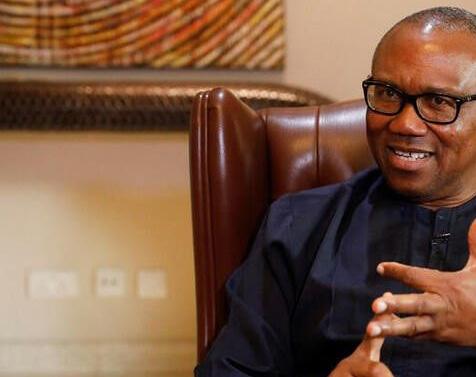
Like the two other prominent front runners, Obi is a successful businessman with vast business interests, and has a net worth running into millions of Naira.
At the age of 61, Obi is the youngest of the three leading contenders in the presidential race. He was born in Onitsha, Anambra State on July 19, 1961. Popularly called Okwute or the Rock by family and close friends, Obi started his early life in Onitsha, where he went to elementary school and then Christ the King College in Onitsha for his secondary education. Thereafter, he proceeded to the University of Nigeria, Nsukka, where he graduated with a Bachelor of Philosophy degree.
As an ambitious young man, his personal desire was to be among the best in his chosen career. “To satisfy this desire, I left Nigeria to study at some of the world’s most prestigious universities,” Obi said. That search for knowledge took him to Lagos Business School, Nigeria (chief executive programme); Harvard Business School in Boston, Massachusetts, United States (mid to mid marketing); Harvard Business School (changing the game); London School of Economics,
UK, (Financial Management and Business Policy); Columbia Business School, New York, (Marketing Management); The Institute for Management and Development, Zurich, Switzerland (Senior Executive Programme); The Institute for Management, Switzerland (Breakthrough Programme CEOs); Kellogg Graduate School of Management, United States ( Global Advanced Management Programme); Oxford University: Said Business School, the United Kingdom (Advanced Management and Leadership Programme) and Cambridge University: George Business School (Advanced Leadership Programme).
Before venturing into politics, the LP flag bearer had been chairman and director
of some high-profile firms such as Fidelity Bank PLC; Chams Nigeria Ltd; Corp Ltd and Card Centre Ltd; Future View Securities Ltd; Guardian Express Bank Plc; Guardian Express Mortgage Bank Ltd; Next International Nigeria Ltd; Paymaster Nigeria Ltd, among others.
Obi was chosen as the head of the Securities and Exchange Commission (SEC) by former President Goodluck Ebele Jonathan in 2015. He also belongs to a number of groups and associations including the Nigerian Economic Summit Group (NESG), Nigerian Chartered Institute of Bankers, and British Institute of Directors, among others.
Having succeeded in his business

Nigeria’s February 25 presidential elections are anticipated to be one of the hotly-contested in the country’s recent political history. Africa Briefing’s Lagos Correspondent, Olu Ojewale, profiles the three leading contenders
ventures, Obi entered into politics, contested and won the governorship seat of Anambra State on platform of the All Progressive Grand Alliance, APGA, in 2003. But the Independent National Electoral Commission (INEC) declared Chris Ngige of the ruling People’s Democratic Party (PDP) as the winner. Obi went to court to challenge the results.
On March 15, 2006, a Nigerian Court of Appeal reversed Ngige’s win. After almost three years of litigation, Obi was sworn in as Governor on March 17, 2006. Just after seven months in office, he was impeached and removed by the State House of Assembly, and Virginia Etiaba, his deputy, became Nigeria’s first female Governor.
After a successful appeal, the Court of Appeal in Enugu restored Obi back into office as Governor on February 9, 2007.
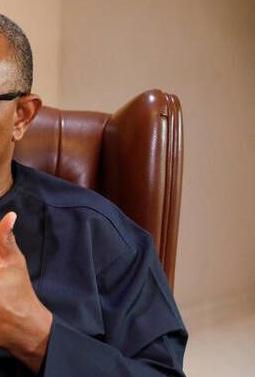
In the elections held in 2007, Anambra State elected Andy Uba of the PDP as the new Governor. Uba was sworn in as Governor on May 29, 2007, thereby forcing Obi once again to leave the office and head to court.
A dogged fighter that he is, Obi told the court that he had not been allowed to serve the four-year term he had won in the 2003 elections, and that his tenure did not begin until he was inaugurated in March 2006.
The Nigeria’s Supreme Court ruled in his favour and reinstated Obi as the Governor of Anambra State on June 14, 2007. The Supreme Court said that Obi’s fouryear mandate should have been allowed uninterrupted until March 2010.
In the 2010 Anambra State gubernatorial election, Obi beat Professor Charles Chukwuma Soludo, a former governor of the Central Bank of Nigeria (CBN) and now incumbent governor of the state.
Obi’s tenure as state governor brought a lot development to his state, and he won a lot recognition as a good administrator. He handed over the baton of the state leadership to Willie Obiano, who was sworn in as governor on March 17, 2014.
Shortly after he left office, Obi dumped the APGA to join the ruling PDP.
Courtesy of President Goodluck Jonathan he was selected to lead the Nigerian Security and Exchange Commission after the 2015 general election (SEC).
In the run-up to the 2019 presidential elections, Atiku Abubakar, who won the PDP presidential ticket, announced Obi as his running partner. The joint ticket failed to unseat President Muhammad Buhari and his party from office.
Perhaps, not willing to play a second fiddle this election year, Obi left the PDP, and joined the Labour Party which graciously gave him the presidential ticket. He has picked Yusuf Datti Baba-Ahmed, a former senator and businessman from Kaduna State, as his running mate.
In the manifesto document titled “Our Pact With Nigerians: Creating A New Nigeria,” the LP presidential candidate promised to focus on seven major areas namely, security, production, institutional reforms, industrial revolution, infrastructural development, human capital development as well as a robust foreign policy.
Specifically Obi and his vicepresidential candidate pledged to “secure and unite our dear nation, and manage our diversity such that no one is left behind in Nigeria.”
They jointly pledged to: “Move Nigeria from consumption to production and embark on comprehensive legal and institutional reforms and practicable restructuring measures, to fight corruption; ensure the enthronement of the rule of law, and decisively tackle all forms of
corruption.”
The LP candidates also promised to “prioritise Human Capital Development through robust investments in STEM education, health, and infrastructural development, with emphasis on wealth creation, distribution and sustainable development.
“Improve access to finance, particularly to MSMEs, youths and women, to significantly reduce unemployment and insecurity.
“Ensure that in policy and practice, governance will be made more inclusive, cost-effective, transformative, and less transactional. No more sharing of the national wealth by a few,” among other promises.
In the manifesto, the LP candidates promised to: “Ensure that our diversity will be leveraged to give women and youths, the aged and persons with disabilities, an unfettered voice in governance, and a renewed sense of patriotism and faith in Nigeria.
While insisting that a new Nigeria is still possible Obi said, “Our vision is a secure, united and prosperous Nigeria that works for everyone and that realises the hope of black people of the world as a city on the hill.
“We will run a government of national unity, bringing together for the task at hand, all competent, honest, and diligent Nigerians, irrespective of their political affiliations.
The new Nigeria we build will be truly “one nation bound in freedom, peace and unity” where “peace and justice shall reign.” According to Obi, for far too long, the dream of a secure, united and prosperous Nigeria has been betrayed by those who lack the character and competence to achieve the dream.

He noted that at present, a new generation of Nigerian leadership has emerged, tested and tried, honest and dedicated, united in a common mission to reverse the current ugly trend of endemic poverty, insecurity, and create a better future for every Nigerian.
Obi expressed confidence that: “The new Nigeria that we will build is a society where political power will no longer be used to serve the interest of the ruling class and subject the people to chronic poverty and deprivation.”
Obi is married and has two grown children – a son and daughter.
ATIKU Abubakar, a former vice-president and presidential candidate of the main opposition People’s Democratic Party (PDP), is one man racing against time. His lifetime ambition to be president of Nigeria seems to be now or never. At 76, he is the oldest of the three leading candidates in Nigeria’s next presidential election. Abubakar who served as the 11th Vice President of Nigeria from 1999 to 2007, is also the most experienced in the race.
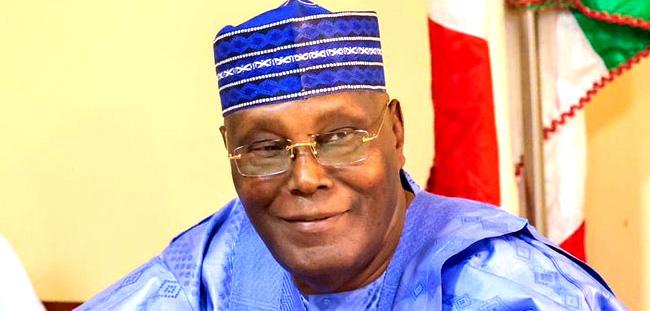
He has unsuccessfully contested five times for the office of president. His presidential odyssey started in 1993 when he contested the Social Democratic Party presidential primaries and lost to Moshood Abiola and Baba Gana Kingibe. He was a presidential candidate of the Action Congress (AC) in the 2007 presidential election, coming in third to Umaru Yar’Adua of the PDP and Muhammadu Buhari of the All Nigeria Progressive Party (ANPP). In 2011 he contested and lost the presidential primaries of the PDP to incumbent President Goodluck Jonathan, who eventually won.
Having joined the All Progressives Congress (APC) in 2014, he again contested the 2015 presidential primaries, but lost to
Muhammadu Buhari. In 2017, he returned to the PDP and was the party’s presidential candidate during the 2019 presidential election, again losing to incumbent President Muhammadu Buhari.
That notwithstanding, Abubakar is a man of destiny. He was born on November 25, 1946 to Garba Abubakar and Aisha Kande at Jada village of Adamawa State. His only sister died at a young age and that made him the only child of his parents. Incidentally, he also lost his father to a drowning accident in a neighbouring village in 1957.
Prior to his death, his father, who did not believe in Western education, had stopped his son from attending the compulsory traditional school. However, when the government discovered Garba Abubakar’s action, he was jailed for few days before his mother-in-law was able to pay for his bail. Afterwards, Abubakar started his primary education at Jada Primary School, Adamawa at the age of eight.
In 1960, he proceeded to Adamawa Provincial Secondary School for further education. Having graduated in 1965, he enrolled at the Nigerian Police College,

Kaduna. But shortly after, he left the college to become a tax official at the Regional Ministry of Finance. In his quest for more education, Abubakar proceeded to the School of Hygiene, Kano in 1966, and graduated with a diploma in 1967. In the same year, he gained admission into the Ahmadu Bello University on scholarship and graduated with a diploma in law in 1969. Thereafter, he joined the Nigeria Customs Service.
Abubakar worked with the Nigeria Customs Service for 20 years and rose to the position of a Deputy Director. He retired in 1989 to go into business and politics. While working as a Customs Officer, Abubakar started a real estate business. With a loan of N31, 000, he built his first house in Yola and rented it out. He used the proceeds from the first house to build his second house. He currently owns several properties in Yola.
In 1981 Abubakar ventured into agriculture. He bought 2,500 hectares of land to start maize and cotton farms. But the business closed down in 1986. Unrelenting, he diversified into selling of rice, flour and sugar.
He had a major business break
After five attempts, this year’s presidential election is a must win for the Adamawa chief if he is ever going to fulfil his lifetime ambition
Gabrielle Volpi, an Italian businessman in Nigeria, invited him to start Nigeria Container Services (NICOTES), a logistics company. Meanwhile, Abubakar was still a civil servant under the Nigeria Customs Service. This brought up accusations of conflict of interest against him because it is an offence for an active civil servant to do another business. He, however, defended himself saying that he only owned part of the company’s shares and was not involved in the day-to-day running of the business. NICOTES today has been renamed INTELS. He also owns Adama Beverages Limited, a beverage producing company in Yola, the capital of Adamawa State; a microfinance bank and several other businesses.
While still with the Nigeria Customs Service, Abubakar also started building his political network and career. He was reputed to have worked underground during Bamanga Tukur’s governorship campaign in 1980s in the now defunct Gongola State. Tukur was the then managing director of the Nigeria Ports Authority. Shortly after, Abubakar met Shehu Musa Yar’Adua, who was second-in-command of the military government that ruled Nigeria between 1976 and 1979.
Yar’adua, who wanted to contest election as president, thereafter invited Abubakar to the political meetings that held regularly at his home. After sometime, Abubakar became the national vicechairman of the People Front of Nigeria, The association was led by Yar’Adua and was in charge of ensuring the success of the transition programme started by General Ibrahim Babangida, the then Head of State. Other big politicians in the team were Babalola Borishade, a former minister, Bola Tinubu, now a presidential candidate, Rabiu Kwankwaso, also a presidential candidate, and Sabo Bakin Zuwo, a former governor of Kano State, among others.
In 1989, Abubakar was selected to represent his constituency at the constituent assembly, set up to form a new constitution for Nigeria. Unfortunately, the government denied the registrations of the People’s Front of Nigeria but members of the party were able to find a place within the Social Democratic Party.
In September 1990, Abubakar announced his candidacy for the gubernatorial seat of his Gongola State. But before the election could hold in 1991, the Federal Government divided Gongola State into two – Adamawa and Taraba states. Abubakar fell into Adamawa State. He won the SDP primaries in November 1991 but was disqualified from contesting in the election. In 1999, he was elected the governor of Adamawa State under the PDP. However, before his swearing
in, he accepted to be the running mate of Olusegun Obasanjo, the presidential candidate of the PDP.
The joint ticket proceeded to win the presidency, with Abubakar becoming vice president from May 29, 1999 and for a second term in 2003. But he eventually fell out with Obasanjo when it was discovered that he wanted to use his popularity in the PDP to contest the presidential primaries against his principal. He also campaigned vigorously against Obasanjo’s bid to amend the constitution to allow him run for a third term in office. Before the end of their second term, Abubakar left the PDP for the first time in 2006, and joined Action Congress (AC).
During the years of his internal battle with Obasanjo, Abubakar’s influence in the PDP was systematically eroded through fresh membership registration that saw most of his supporters pushed out of the party. This was to ensure that he was not nominated to succeed Obasanjo in office.
Thus, Abubakar picked the AC ticket to run for president in the 2007 election. He was in the AC from 2006 to 2009. Following disagreements with Bola Tinubu, one of the leaders of the AC, and former governor of Lagos State, the former vice president dumped the AC and returned to the PDP in 2009. Abubakar ran for the PDP presidential ticket in the 2011 election and lost to incumbent President Goodluck Jonathan.
Abubakar joined the All Progressives Congress (APC) on February 2, 2014 to further pursue his presidential ambition. But this was not to be as he came third in the party primaries which gave the presidential ticket to Buhari in December 2014. He left the APC on November 24, 2017, and returned to the PDP on December 3, 2017. During his tenure as the Vice President in the Obasanjo administration, Abubakar was firmly in charge of Nigeria’s economy, and he presided over the deregulation of some government agencies.
Abubakar has outlined a vision to “foster a united Nigeria in which all citizens can live a happy, healthy and productive life,” it also has the mission to “provide the appropriate political leadership to implement a robust development agenda and facilitate the realisation of our vision.”
He pointed out that the country has never been so overwhelmed by insecurity, adding that “sadly, we have reached a point where the functions of the state have been usurped by separatists, bandits, insurgents, and terrorists.” Interestingly, the PDP presidential candidate, revealed that the policy document tagged, ‘My Covenant with Nigerians,’ is an updated version of the 2019 document which could not be implemented for the benefit of Nigerians.
The policy document, which was summed up to a five-point development agenda, also seeks to restore Nigeria’s unity through equality, social justice, and cooperation, among various people. The document further reveals that Abubakar will establish a strong and effective democratic government that will guarantee the safety and security of life and property.

The former Vice President stated that if elected as Nigeria’s President, he would build a strong and prosperous economy, creating jobs and wealth as well as lifting millions out of poverty.
The presidential aspirant proposes to break government monopoly in all infrastructure sectors, including refineries, rail transportation and power transmission.
To avert persistent price distortions, according to the policy document, the current interventionist exchange rate management policy would be eliminated.
Abubakar also promised to rely more on optimising the fiscal space to generate more revenues for development. He projected a fiscal regime that is stable and predictable and can clearly bridge the gap between the national revenue yield and national expenditure.
He highlighted some of the fiscal strategies his administration will employ to include domestic reforms to improve internally generated revenue (IGR), promoting export growth to improve foreign exchange earnings, blocking leakages and financing projects through strategic partnerships with the private sector.
On security, the PDP flag bearer said he would rely mainly on alternative approaches to dispute resolution, as against relying only on kinetic approach to crush insurgency.
He also promised to make state governments more viable as centres of development, by decentralising security institutions, promising to deal decisively with terrorism, kidnapping and other crimes.
On anti-corruption, Atiku said that the fight against corruption would be tackled head on by championing institutional reforms of the agencies and further strengthen them.
The PDP presidential candidate has four wives and 28 children. As a successful businessman, it is estimated that he is worth more than $100 million.
Unless he wins, this year’s presidential election may be the end of his ambition to govern Nigeria. At the next election, Abubakar will be 80 years and may not have the appeal and strength to secure the necessary votes.
BOLA Ahmed Tinubu, 70, is a Nigerian politician and the presidential candidate of the ruling All Progressive Congress (APC). He is one of the three leading candidates out of 18 jostling for the presidency in Nigeria’s general elections this year. He has more than three decades experience in Nigerian politics, having been a Senator and Governor. He is also a successful businessman with interests in oil and gas, property and hotel businesses. He is estimated to be worth more than $10 billion in assets.
Tinubu is also a well known political godfather who has been responsible for the elections of a number of politicians, especially in South West of Nigeria. He spearheaded the campaign that got the incumbent President Mohammadu Buhari votes in the South West in the past two elections.
So his emergence as the ruling APC flagbearer was more or less a payback for him. But it was not also easy for him. With the likes of Vice President Yemi Osinbajo, Chibuike Rotimi Amaechi, the Transport Minister and others in the race, he sensed that he might not get the presidential ticket. He had to cry out: “Emi lo kan” meaning “it is my turn.”
It is understandable. Having been a kingmaker for so long, Tinubu now wants to be a king. After all, he has the credentials that qualifies him for the nation’s plum job.
Besides, he had been one of brains behind the establishment of the party. Indeed, following the victory of the PDP in 2007, Tinubu was involved in the negotiations to bring together the fragmented opposition parties to form a mega-party capable of removing the ruling PDP from power in 2011. The negotiations yielded fruits when four big parties, namely the Action Congress of Nigeria, ACN; the Congress for Progressive Change, CPC; the All Nigeria Peoples Party, ANPP and a breakaway fraction of the All Progressives Grand Alliance, came together to become All Progressive Congress on February 6, 2013.
Tinubu’s plan was realised when Buhari, the candidate of the APC, defeated incumbent President Jonathan of the PDP, thereby ending 16 years of the party in power.
Born into the famous Tinubu family in Lagos on March 29, 1952. He started his education at St. John’s Primary School in Aroloya, Lagos, and continued at Children’s Home School in Ibadan, Oyo State, South West Nigeria.
From there, he went to Richard Daley College in Chicago, Illinois, United States. There, he did well enough to get on the honours list. Thereafter, he went to Chicago State University in Illinois, where he got a Bachelor of Business Administration (Accounting and Management).
During his time as an undergraduate, he won the Outstanding Student’s Award, the University Scholar’s Award, and the Certificate of Merit in Accounting and Finance.
Tinubu was on the Dean’s List and won the Outstanding Student’s Award, the University Scholar’s Award, and the Certificate of Merit in Accounting and Finance while he was in college. He also got the highly regarded (Sumna cum laude) award for getting 3.54 out of a possible 4.0 GP.
In his last year at the university, he was elected president of the Accounting Society of the institution. This was his first political election.
After graduation in 1979, Tinubu worked for Arthur Anderson, Deloitte Haskins and Sells (now called Deloitte Haskins and Touche), and GTE Service Corporation, which is the largest communication and utility company in the United States.
While at Deloitte Haskins and Sells, the young professional broadened his experience by participating in the auditing and management consultancy services of General Motors, First National Bank of Chicago, Procter and Gamble, International Harvester, GEC and other Fortune 500 firms.
On his return to Nigeria in 1983, Tinubu joined Mobil Producing Nigeria as a Senior Auditor and he retired as the company’s Treasurer.

On leaving the services of Mobil, he entered into the murky waters of Nigerian politics. His political odyssey first started under the tutelage of Dapo Sarunmi and Prince Ademola Adeniji, who were then the prime movers of the Lagos-based Primrose political group. In the convoluted political events of the Ibrahim Babangida administration, Tinubu joined forces with the progressives, which formed the bulk of the defunct Social Democratic Party, SDP. In the then political transition, he was elected a Senator, representing the Lagos West Senatorial District in 1992. At the National Assembly, he distinguished himself as the Chairman of the Senate Committee on Banking, Finance, Appropriation and Currency - a foremost committee of the Senate.
Tinubu’s chance to emerge into political limelight came with the arrest and detention of Chief Moshood Abiola for declaring himself president following the annulment of the June 12, 1993, elections for which he was widely adjudged to have won. He became a founding member of the famous pro-democracy group, the National Democratic Coalition (NADECO) which, for several years, engaged the military in contest for the very soul of Nigeria.
Consequently, Tinubu like other members, suffered many arrests, detention, harassments and constant threats, which forced him to flee Nigeria for his personal safety.
Nevertheless, he did not give up the struggle as he joined the NADECO members abroad to continue the agitation for a restoration of democratic governance and the rule of law Nigeria. He also played a pivotal role in mobilising and organising the international and local opposition to the General Sani Abacha military regime which had clamped down on pro-democracy agitators.
In 1998, after the demise of Abacha, Tinubu returned to Nigeria to join other
Nigerians in the National Reconciliation and Development. A year later, he was elected as an Executive Governor of Lagos State on the platform of the Alliance for Democracy (AD). He served two terms of four years each from 1999 to 2007.
During his time as governor, Tinubu founded 37 Local Council Development Areas throughout the state so as accommodate its large population. This brought him in collision with President Olusegun Obasanjo, who argued that he had no such authority to create the LCDAs. Consequently, the federal government confiscated cash intended for the state’s municipal councils. Despite court’s decisions in favour of the Tinubu administration, Obasanjo refused to release the funds to Lagos State until he left office.
Tinubu also had a fraught relationship with Kofo Bucknor, his first deputy for the first four-year tenure. He was re-elected in 2003 with Femi Pedro, a bank executive, as his deputy.
In the eight years he was in government, he made significant expenditures in the state’s educational system and reduced the number of state schools by handing over many of them to the private sector. He started a number of road networks to accommodate the state’s rapidly expanding population.
Although, his pledge to build 10,000 housing units for the underprivileged when he took office in May 1999, never materialised, he drew many development plans which his successors are now said to
be implementing.
Since leaving office, Tinubu has proven to be an adept political godfather who has been responsible for elections of a number of politicians, especially in Lagos State and some states in the South West of Nigeria.

For instance, towards the end of his term as governor, Tinubu handpicked Babatunde Fashola, his chief of staff, as his successor instead of Pedro, his deputy. He also picked Akinwunmi Ambode as Fashola’s successor. When Ambode fell out with him, the godfather simply denied him a second term in and beckoned on Babajide Sanwo-Olu, the current governor of Lagos State to replace him.
Now that Tinubu is on the ballot, he is promising Nigerians a number of goodies if elected president. With an 80page manifesto titled: “Renewed Hope 2023 – Action Plan for a Better Nigeria,” the former Lagos State governor has vowed to prioritise national security, economy, agriculture, power, oil and gas, transportation and education when elected as Buhari’s successor after the 2023 election. He also outlined policy options for healthcare, digital economy, women empowerment, judicial reform, federalism, decentralisation of power and foreign policy.

A statement issued by the Director of Media and Publicity, Tinubu-Shettima Presidential Campaign Council, Bayo Onanuga following the release of the manifesto reads: “Our nation’s history
affirms that our people constitute our most valuable treasure. Whether the hardworking farmer, the industrious market woman, the dynamic young entrepreneur or the hopeful child, Nigerian people rank among the best anywhere. They excel in every aspect of human endeavour when given a fair chance.
“Senator Shettima and I have traversed every part of our beloved nation, listening to the concerns of our fellow citizens. Young and old, poor and rich, educated and uneducated, Christian and Muslim; all have expressed their views and concerns. People do not seek superficial answers to hard questions. Nor do they want the broken, unimaginative, failed promises repackaged and fed to them again. They want true and innovative solutions which address the challenging realities of today.
“Our party, the All Progressives Congress, was founded on the premise that the people of our beloved country are entitled to the benefits that only progressive good governance can procure.”
But whether Nigerians are going to overlook the fact that his running mate, Kashim Shettima, a former Governor of Borneo State, and a Muslim like him, is another matter.
Tinubu is married to Oluremi Tinubu, the current Senator of central Lagos State. It is not clear how many children he has. News reports say that Abibat Tinubu, his youngest daughter, graduated from a Music college in Boston, Massachusetts, US, in 2013.
WHILE the EndSARS began initially as a collective protest against the inhumane, corrupt and unprofessional conduct of a special unit of the Nigerian Police Force known as the Special Anti-Robbery Squad in the last quarter of 2020, it expanded to draw attention to perennial governance issues including corruption, rights violation, lack of economic opportunities, insecurity and increasing poverty levels. The EndSARS became a rallying point where legitimate grievances of the Nigerian population converged.
The youth realised their enormous power as an organised group with access to social media, but more importantly the fact that politics was much too important to be left in the hands of the elites. As Nigerians go to the polls in February, there is a sense that lessons from the movement can be brought to bear in shaping electoral outcomes for 2023.

The impacts of the movement as well as the state’s response resonate hugely in Nigeria’s political space and would, potentially, play a part in the coming elections. While social movements have a long history, waves of democratisation following the end of the Cold War provided new impetus for organised movements both in scope and intensity. Globalisation created incubators for multiple social forces thereby increasing the appetite for collective action both for good and for bad.
While the EndSARS fell short of clearly achieving the stated primary goal of ending police brutality and, by extension, reforms in other critical governance sectors, it had considerable impact on the sociology, discourses and consciousness around active social engagement in Nigeria’s political space. More generally, four key impacts are identified and discussed.
First and perhaps, the most fundamental impact of the movement is the rise in political consciousness and awareness. It became clear that major political, economic
and social reforms would not materialise when the most important demography and by far, the most affected by the tragedy of corruption-infested governance remain unbothered.
Towards the country’s 2023 election, there is an unprecedented presence of youth voices and online advocacy at rural and urban spaces driving the currents of political narrative to achieve a Nigeria of their dream. The change in mindset is clearly reflected in the recent figures released by the Independent National Electoral Commission (INEC) on the 2023 election, which revealed that 40 per cent of newly registered voters are students and almost 70 per cent are youth.
Second, the movement encouraged more assertive expression of grievance by different groups against the Nigerian state. It brought to the fore, the undercurrents of prolonged agitations that are rooted in poor socioeconomic condition, perceived marginalisation and or attempts by groups to dominate others.

The agitation for Yoruba Nation from 2021 to 2022 and heightened secessionist call by the Independent People of Biafra (IPOB) are cases in point. While the cited
agitations have long been mutating, they took a more forceful turn post-EndSARS.
Third, as a consequence of the movement, there was significant destruction of limited public infrastructures especially in cities like Lagos. Coupled with this was a temporary breakdown of law and order in states like Imo, Anambra, Lagos, Edo, among others, including attacks on police stations and correctional facilities, freeing prisoners.
As a result, post-EndSARS witnessed an increased spate of criminality and general insecurity. The state’s security apparatus became relatively weak, demotivated and less responsive to their primary responsibilities.
Fourth, the repressive response by the state and unwillingness to demonstrate good faith towards the implementation of the specific demands of the young protesters further deepened the trust gap between the government and the governed. Although the SARS unit was disbanded and panels of inquiries set up in many states, the unit only ceased to exist in name and the reports of the government-constituted panel only received considerable attention from the Lagos State government.
The trajectory of the EndSARS movement in Nigeria is a grim reminder of the endemic challenges of governance, leadership and fragile state-society relations prevalent in many parts of Africa, but it could make a huge difference at the polls, argues Wale Olusola
The 2023 election is unique in many respects, especially against the backdrop of the EndSARS and the flurry of conversation it generated. Three leading candidates are vying for the highest political office. Together, they represent the three major ethnic groups – Hausa, Igbo and Yoruba.
More importantly, the forthcoming election is generating unprecedented level of enthusiasm among the youth and different segments of the society. There is a sense in which the anger and disappointment of the EndSARS is being translated into political activism and opportunity to bring about desired change or a new political order.
The outcomes of the EndSARS, in retrospect, has become a major driver of current enthusiasm among young Nigerians. This and other issues which featured prominently during the EndSARS movement could potentially influence the outcome of the 2023 election.
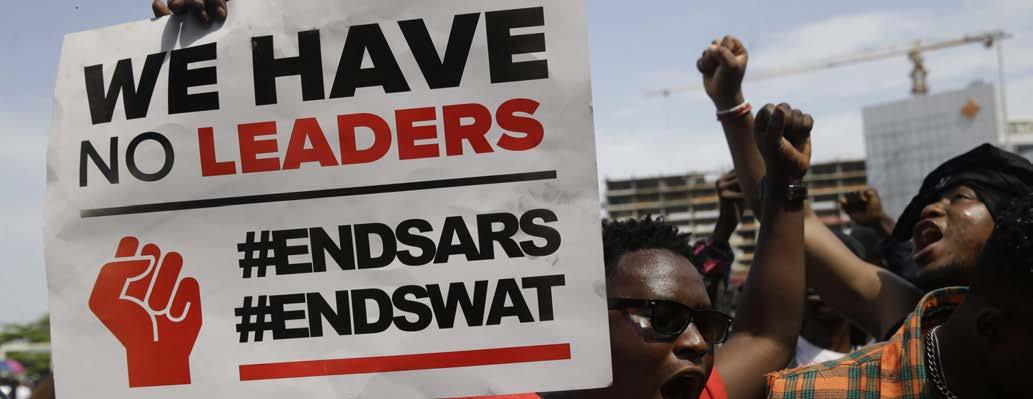
First, the 2023 election has been described as an election for the young people. With 37 million (aged 18-34), representing 39 per cent of the total registered 93.4 million voters, the youth constitute the highest percentage of the voting population. Among these are 26 million students who are eligible to vote.
Second, given the pivotal role of social media during the EndSARS, its power as an effective tool for social mobilisation has been realised, harnessed and deployed to ensure a massive turn out for voter card registration, collection and voting on election day. This may well turn out to be the election most monitored and reported via social media.
Third, security agencies would play a critical role in the election but the more important question would be what kind of role, given its antecedent in previous elections? Will the experience of the EndSARS which centred largely on security officials encourage a different conduct that is able to promote a culture of integrity in the voting process?
Fourth is the prevailing socioeconomic condition that united the young EndSARS protesters. President Muhammadu Buhari, who is due to complete his term by May this year, is believed to have failed to achieve the change he promised in 2015.
Currently, the candidate of the Labour Party, Peter Obi, enjoys widespread support from Nigerians within and in the Diaspora. He is regarded as the people’s candidate and loved for his shrewd, prudent and honest management of public resources as a two-term governor of Anambra state, in the South East region of Nigeria between 2006 and 2014.
Many online polls put him ahead of others but it is difficult to tell if this would translate to actual votes. Nevertheless, he has to contend with the candidates of the ruling party and the main opposition party who boast of entrenched political structures, resources and networks that the former lacks.
Regardless of who wins, the next president of Nigeria would be confronted with a mountain of challenges. On security, armed groups such as the IPOBESN; bandits, herdsmen, Boko Haram, and Islamic State West Africa Province (ISWAP) are still on the prowl.
Between January and June 2022, there
were over 2,200 political violence and protest events and over 5,910 reported fatalities. In addition, Nigeria ranks 6th in the Global Terrorism Index among the 10 most impacted countries by terrorism in 2022.
On the economic front, the next administration will have to deal with N77 trillion domestic and external loans while the inflation rate as at December 2022 stood at 21.34 per cent from a 17-year peak of 21.47 per cent in November. Even more worrisome is the current unemployment record at 33 per cent, with youth unemployment at 42 per cent, which explains the increasing poverty levels in Nigeria.
According to the National Bureau of Statistics, 133 million Nigerians (63 per cent) are multi-dimensionally poor. Added to these is the scourge of corruption, the task of uniting a hugely fractured country, cutting wastes in public offices and making democracy work for all.
The next president will have to demonstrate bold leadership by committing himself to respecting the rule of law and fundamental freedoms, promote inclusion in all public life and engage young men and women in governance. He must conscientiously seek the buy-in of all represented interests and lead by example, ensuring reforms that change the orientation, value system and priorities of Nigeria domestically and in its relation with other countries.
If the outcome does not favour popular wish, the reaction could be that of resignation or protest, but there would be just enough for everyone to learn about how much has changed or remained the same.

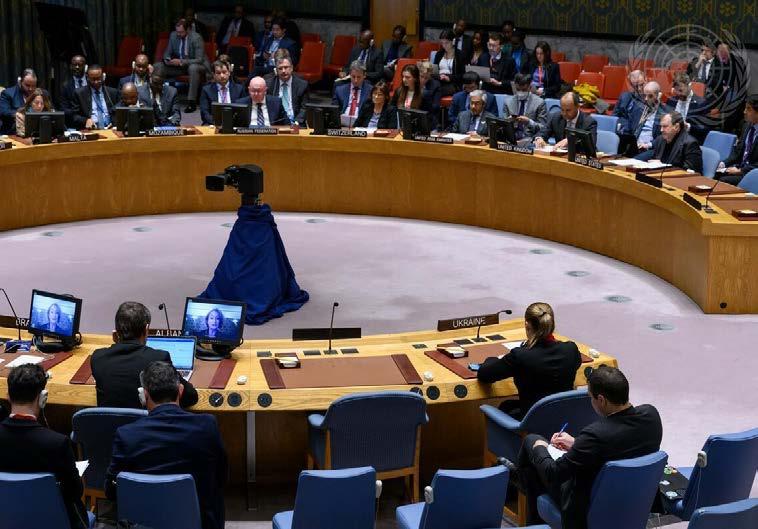
The University of Pretoria’s Centre for the Advancement of Scholarship and Future Africa in South Africa, partnered with the Sweden-based Nordic Africa Institute, to host a policy dialogue on Africa and the UN Security Council in October 2022. It involved senior diplomats, heads of UN agencies, civil society, media, scholars, and students with three key aims: to strengthen the effectiveness of the Elected 10 members on the Council in promoting positive peacekeeping outcomes in Africa; to craft ideas to ensure an effective division of labour between the UN, the European Union, and Africa’s regional bodies in strengthening Africa’s security architecture; and to increase the meaningful participation of women and human rights priorities in peace processes across the continent. Africa Briefing publishes excerpts from the policy brief based on key discussions and recommendations from the meeting
EFFORTS are once again afoot – for the first time in four decades – by Western actors to strengthen the role of the 193-strong UN General Assembly in the area of peace and security. But like the Council, the Assembly is also divided on many of these thorny issues.
The five veto-wielding permanent members (P5) of the Council – the US, China, Russia, France, and Britain – who are mandated to maintain international peace and security, ironically account for 76 per cent of arms sales that fuel global conflicts.
Though the conflicts in Libya and Syria have divided the Security Council since 2011, tensions have recently increased between a Sino-Russian bloc and the Western trio of the US, France, and Britain. The business of the Council has, however, continued on non-Ukraine cases, with 36 resolutions having been passed between January and October 2022.
Four vetoes have nevertheless been cast over Ukraine (twice), North Korea, and Syria. The
Ukraine conflict has raised the spectre of a new Cold War pitting Pax Sinica against Pax Americana. This triggered a lively debate over the efforts by African, Asian, and Latin American states to revive a new “non-alignment” in order to avoid becoming embroiled in what many see as great power “proxy wars”.
[Thus], American President Joe Biden’s call at the General Assembly in September 2022 for the expansion of the Security Council in order to bring in permanent representation from Africa, Latin America, and elsewhere, generated much debate at the dialogue. France has also called for text-based negotiations on Council reform, while Paris, London and the Nordic countries have backed greater African representation on the Council. Many speakers advocated the
expansion of an unrepresentative Council that has not been reformed since it was expanded from 11 to 15 members in 1965. Some explicitly called for countries such as Nigeria, South Africa, Brazil and India to be brought into the Council to make this anachronistic body more representative of the world of 2022, rather than that of 1945.
There were also calls to reform the UN’s working methods, and a suggestion of reserving one of three African rotating seats for regional powers such as Nigeria,
South Africa, Algeria, and Ethiopia in order to ensure consistently strong African representation on the Council.
Though half of the Security Council’s resolutions over the last two decades have related to Africa, only 6.5 per cent of these have had a sole African pen-holder drafting them. Perversely, France, Britain, and America write all the Security Council resolutions in 11 out of 13 African cases, as if continuing colonial spheres of influence.
Currently, Russia drafts two resolutions (on Central Asia and the Golan Heights), while China drafts none. African and other regional powers were therefore urged to seize these pens from the hyperactive Western trio, and ensure that they become pen-holders on cases relating especially to the continent.
The October 2022 policy meeting was also held as conflicts have proliferated in African theatres such as the eastern
Congo, Central African Republic, Chad, Mali, Guinea-Bissau, Somalia, Sudan, and Mozambique, with 70 per cent of the Security Council’s deliberations typically focusing on the continent. About 22 million people in the Horn of Africa remain in danger of starvation, even as the rich world reneges on promises of providing $100 billion a year by 2020 to supporting African and other developing country efforts to tackle climate change and its deleterious impacts.
The main focus of the deliberations was Africa, to which 84 per cent of the UN’s 70,000 peacekeepers are deployed. With 22 debt-distressed African countries needing relief, there were calls to divert more resources from security to development, and to prioritise conflict prevention in order to address the root causes of conflicts.

The Council has clearly not done
enough to strengthen the capacity of African regional organisations, and to collaborate more effectively with them in the field. Often led by South Africa in 2019/2020, African states on the Council worked with China and Russia to push back against Western preferences in Abyei, Burundi, Darfur, South Sudan, Somalia, and the Democratic Republic of Congo.
South Africa’s “Ubuntu diplomacy” is a “soft power” tool to promote its interests through attracting others to its values and principles. The country was able to build institutional memory through its two previous stints on the Council in 2007/2008 and 2011/2012, as well as through continued hosting of, and participation in, monthly E10 meetings in a process initiated with Sweden in 2018. During all three of its Council terms, Tshwane (Pretoria) prioritised the strengthening of the UN’s relationship
with the African Union and other regional bodies.
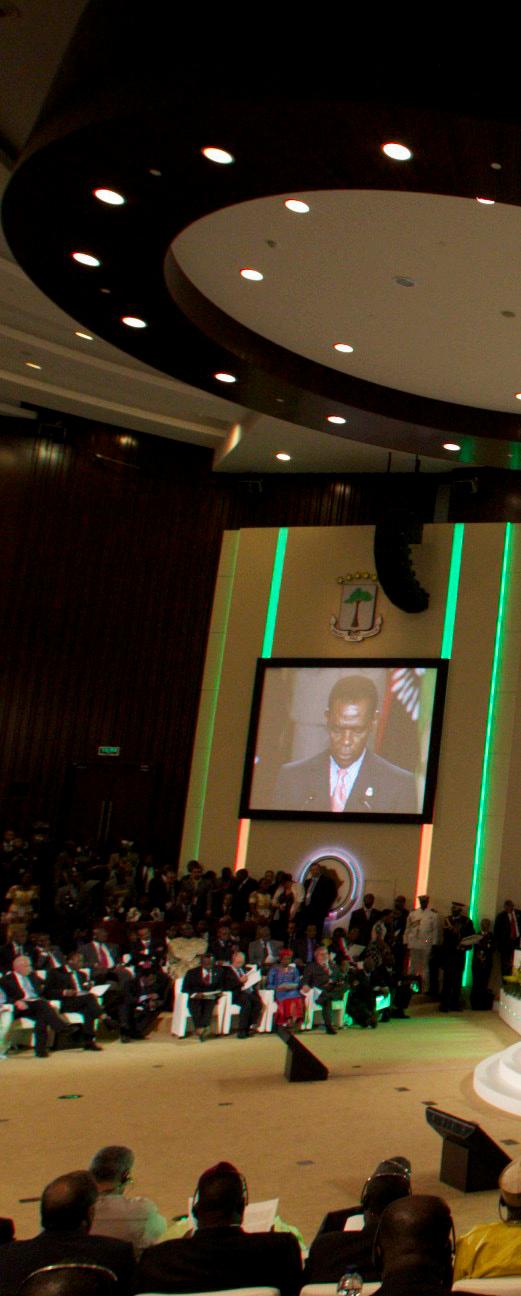
The three African members (A3) of the Council – Ghana, Gabon, and Kenya in 2022 – now coordinate their efforts closely with the AU Commission in Addis Ababa, with quarterly meetings facilitated by AU Permanent Observer to the UN, Nigeria’s Fatima Mohammed. The A3 collaborated effectively with the Caribbean island of Saint Vincent and the Grenadines in 2020/2021.
It has consistently but unsuccessfully called for the UN to fund 75 per cent of African-led peacekeeping operations through UN assessed contributions. There were also calls for a long delayed 25,000-strong permanent African Standby Force (ASF) to be urgently established, and for the AU’s $315 million Peace Fund to be massively increased.
Tensions have historically been evident in the UN’s peacekeeping collaboration with the AU in Darfur, CAR, and Mali, even as 16 meetings have been held between both security councils. The EU has deployed four small military missions into the DRC (twice), Chad, and Chad/ CAR, which were sometimes seen to be pursuing parochial French interests in Africa, while 13 meetings have been held between the security bodies of the AU and the EU.
The October 2022 policy dialogue also reflected on the Security Council's thematic work focused on the human-centred themes of the Women, Peace, and Security (WPS) agenda, and the Protection of Civilians. In the post-Cold War era, the Council has undergone a normative expansion from seeking to address mainly traditional statecentric security threats to taking special measures to address the vulnerability of unarmed civilians.
Since the passing of Security Council resolution 1325 of October 2000, WPS has since developed into a broad framework based on 15 thematic resolutions that have called for protecting women’s rights, halting conflict-related sexual violence, integrating gender into conflict prevention and peacebuilding efforts, and increasing the participation of women in peace and political processes.
The WPS agenda has been embraced by elected members of the Security Council, with its founding resolution 1325 having been adopted under Namibia’s presidency of the Council in October 2000. While the US and Britain hold the
pen for this thematic area, E10 members have strengthened the Council's working methods in this area in order to advance its implementation.
Sweden, for example, used its membership of the Council in 2017/2018 to incorporate WPS language into Council statements and resolutions. Stockholm thus introduced more robust and contextrelevant benchmarks for women's empowerment and inclusion into peace talks and gender-sensitive humanitarian action.
This enhanced the consistent collection of sex-disaggregated data. These measures were often based on information provided by women's civil society organisations.
Since 2018, there has been an 18 per cent increase in WPS language in Council resolutions. E10 members have further developed other mechanisms beyond formal resolutions. Niger – a member of the Council in 2020/2021 – worked with the AU and the EU to launch the UN Group of Friends of Women of the Sahel in June 2022.
In 2021, Ireland, Kenya, and Mexico established the Presidency Trio for WPS during their consecutive tenures. The Trio further pursued the shared goal of achieving gender balance among briefers to the Council. Incoming elected states, such as Switzerland (2023/2024), plan to build on these priorities.
There is an urgent need to identify gaps, accelerate implementation, and improve how the Council addresses WPS issues. Following recommendations from the 2015 Global Study on WPS, E10 member, Spain, invited the first civil society briefer, Liberia’s Victoria Wollie of the West Africa Network for Peacebuilding (WANEP), to address the Council.
Sweden’s July 2018 presidency represented the first time that gender parity was achieved in Council briefers. Since then, civil society briefing on WPS issues has become a regular practice. However, women briefers from Africa have often expressed their frustration at the lack of follow-up after Council briefings.
They have also complained that their testimonies on the Council frequently constitute dramatic performances of female suffering that do not lead to concrete outcomes capable of transforming the lives of women in conflict zones. Moreover, some briefers have faced public backlash after addressing the Council, sometimes
being targeted for political violence and harassment.
More positively, women have increasingly served as negotiators or members of delegations in UN peace processes. The AU established the Network of African Women in Conflict Prevention and Mediation (FemWise-Africa), while European countries have set up similar networks for the Nordic and Mediterranean regions. South Africa has also provided training to 700 potential women mediators.
These efforts have, however, had mixed results. While women are keen to
be part of peace processes, they are often not invited to participate in formal regional mediation and facilitation efforts.
The following ten policy recommendations emerged from the October 2020 meeting:
• The UN Security Council must be urgently expanded to bring in countries from the global South such as Nigeria, South Africa, Brazil, and India in order to make the organisation’s most powerful organ more democratic and representative of the contemporary world.
• A non-aligned bloc within the Council can potentially play a role in balancing the overwhelming dominance of the vetowielding P5, while building coalitions with other E10 members who should use the knowledge and institutional memory that resides within the UN secretariat more strategically to inform Council decisions.
• The Security Council should fund African-led peacekeeping missions through UN assessed contributions; the 25,000-strong permanent African Standby Force must be urgently
established, and the AU’s $315 million Peace Fund massively increased; one of the three African rotating seats should also be reserved for regional powers such as Nigeria, South Africa, Algeria, and Ethiopia, in order to ensure consistently strong African representation on the Council.
• The working methods of the Security Council must continue to be revised to ensure greater transparency and participation, particularly in the penholding system of drafting Council resolutions.
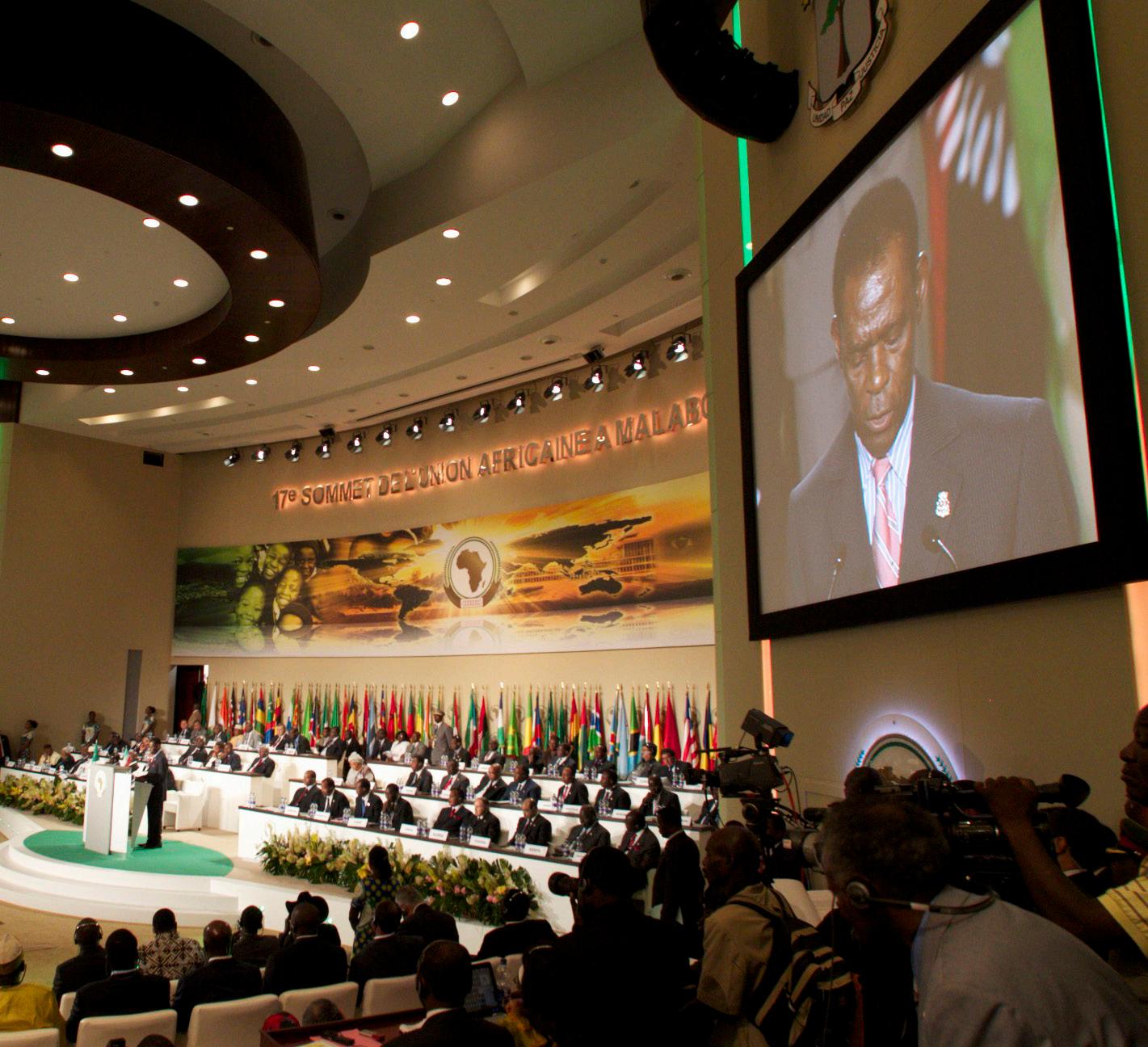
• It is important that the Council establish early warning systems based on best practices over the last three post-Cold War decades, and institutionalise them effectively into the mechanisms of the UN and African regional bodies in order to ensure early action and avoid costly military interventions after conflicts have already erupted.
• Regarding the Women, Peace, and Security agenda, the Council must address gender hierarchies, values, and attitudes. Thus, UN entities such as the Office of the UN High Commissioner for Human Rights, the Peacebuilding Commission, and the Human Rights Council should contribute more effectively to a protective, gendersensitive environment based on their areas of specialisation.
• On the protection front, measures by the UN should become more holistic. Mandates to prevent armed actors from committing sexual violence must go beyond advisory services and securitised tactical patrols, and prioritise initiatives that work with men and boys; provide socialisation training to armed actors; and support survivors of rape and abuse with psycho-social therapy and livelihood development.
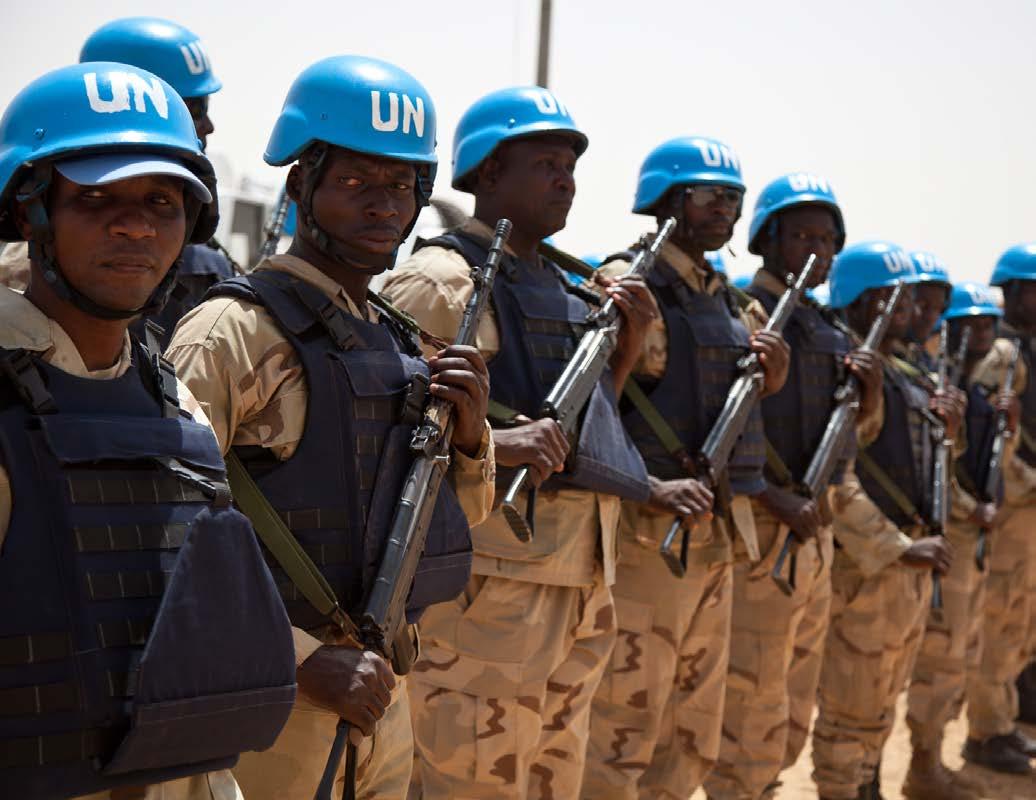
• The UN’s reports relating to WPS tend to rely disproportionately on Western academic and policy sources; African research institutions who are closer to conflict situations on the continent, must therefore provide more research and information to enrich these reports.
• The link between security and development should continue to be made
through implementing the UN’s SDGs and strengthening the UN Peacebuilding Commission; UN Secretary-General António Guterres’s suggestion of a stimulus plan of two per cent of global Gross Domestic Product of $500 billion, should be made available in order to stimulate the world economy, with infrastructure and electrification particularly prioritised.
• Finally, debt relief must be urgently provided, particularly to the 22 debtdistressed countries in Africa, by suspending onerous debt payments in order to ensure that these countries can recover from the triple plagues of conflicts, climate change, and Covid/19. Multilateral funds should also be leveraged to ensure the long-term resilience of societies in distress.
The policy brief was published in November 2022. Meeting rapporteurs were Professor Adekeye Adebajo, Senior Research Fellow, Centre for the Advancement of Scholarship, University of Pretoria; and Dr Angela Muvumba Sellström, Senior Researcher, Nordic Africa Institute, Uppsala
WHILE it is true that President Adama Barrow has repeatedly promised that his government will ensure respect for human rights and the rule of law, the Never Again concept was never his or his government’s promise to the Gambian people. Never Again was introduced into The Gambia’s transitional justice process and discourse by former staff of the Truth, Reconciliation and Reparations Commission (TRRC).
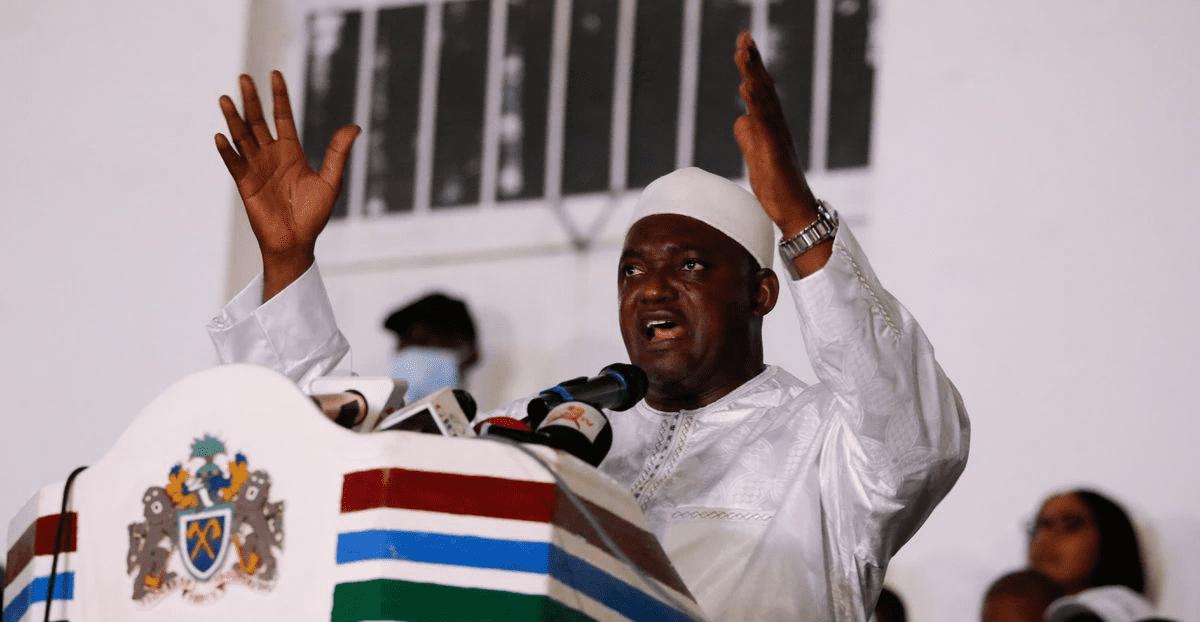
Nine months before the commission itself was sworn in, we took every
opportunity to repeat to the Gambian people, through the media, that the TRRC’s main reason for being was to help ensure that never again would they have to experience the lack of human rights and rule of law that they endured under President Yahya Jammeh.
The TRRC secretariat launched a countrywide Never Again campaign as soon as its various units were created and staff recruited and trained in the basics of truth commission work. The campaign was rolled out through outreach activities to schools and communities across the
country by the TRRC secretariat’s Youth and Children’s Network Unit, the Women’s Affairs Unit, the Reconciliation Unit and the Communications Unit.
When the commission was inaugurated and the hearings finally got underway in January 2019, it adopted Never Again as its slogan. Work on actualising it through civic education and popular engagement and empowerment in schools and communities across the country continued unabated until the end of the commission’s mandate in early 2022.
Although the slogan Never Again was coined by staff of the Truth Commission to reinforce the need for better freedoms in the post-Yahya Jammeh era, Baba Galleh Jallow would now like the government to adopt this as official policy to strengthen the concept
Thus, Never Again was not a government initiative. On the contrary, it was an initiative designed to hold government accountable and by empowering Gambians to do just that.
Ultimately, it is a project designed to continue the very reason for the launching of the Gambian transitional justice process, and in particular the TRRC. Namely, to ensure that never again shall Gambians have a dictatorship or rampant human rights violations in their country and to help promote national unity, social cohesion and a culture of mutual respect and tolerance in The Gambia.
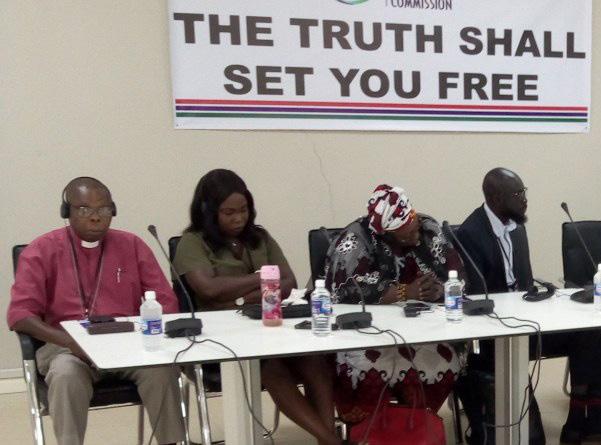
As of now, the Never Again Network is continuing that campaign, not only engaging mainly young people but also addressing the government and general public as necessary.
The Gambian government should therefore adopt Never Again as state
policy, either de facto or de jure. Even if no legislation is enacted to make it a de jure policy, a commitment and determination, backed by concrete actions, should be adopted to make it official.
There is no better way to ensure respect for human rights and the rule of law, promote peace, stability, healing, reconciliation, social cohesion and national unity and to prevent dictatorship and human rights violations than by adopting Never Again as official policy. The government should seriously consider this proposal, especially by creating a National Peace Commission, according to the recommendations of the TRRC.
A fact that seems to be perpetually lost to many governments in Africa and across the world is that human rights violations are extremely subversive of government authority. The more a government violates the rights of its citizens, the more it
subverts its own authority, the more it erodes its own legitimacy, and the more it destroys the foundations upon which it is built.
A government that violates the rights if its citizens is a government that progressively alienates the people; a government that creates more enemies for itself; a government that grows increasingly unpopular; and a government that, sooner or later, shall be considered unfit to govern and therefore kicked out of power either through elections, or through an illegal seizure of power by the military.
When Jammeh and his government started violating the rights of Gambians in the aftermath of the July 22, 1994 coup, some of us repeatedly warned him of these same dangers. We warned him that if he continued violating the rights of the Gambian people, he shall pay a heavy price in the end.
But intoxicated with the wine of power and blinded by hubris, he refused to listen. We all know what happened to him eventually. He became increasingly feared and hated by the people; several attempts were made to violently topple his government, and he was eventually unceremoniously voted out of power.
Today, he lives in exile in a foreign land, abandoned by his former blind loyalists, a fugitive from international law, wanted for crimes against humanity. Even though he is yet to face charges in a competent court of law, Jammeh will never be a free man again.
Make no mistake about it: a similar or worse fate awaits any head of state whose government keeps violating the rights of its citizens. Sooner or later, the violations will catch up with that head of state and those who aid and abet him in committing human rights violations. History is replete
with examples.
In his 2023 New Year address, Barrow called on all Gambians to respect the rule of law and help prevent crime in the country. That is indeed how it should be. What is often lost or overlooked by many heads of state and government authorities is that disrespecting the rule of law and committing crimes is not the exclusive preserve of citizens.

In fact, as the TRRC finding and recommendations reveal, governments are often most responsible for disregarding the rule of law and committing the most serious crimes in society. Governments often disrespect the rule of law that they are meant to preserve and commit crimes against citizens.
Governments often do this because they hold a monopoly on the ownership and use of legitimate force, and because they are so engrossed in protecting their
power that they lose sight of the need for care and moderation in dealing with critics and perceived opponents.
The rule of law embodies respect for due process. According to Gambian law, when a suspect is arrested, they need to be charged with a crime within 72 hours or released. Except in exceptional circumstances, holding a suspect without charges for over 72 hours violates the rule of law.
But the concept of Never Again goes beyond the prevention of human rights violations by the state. It includes the reduction of public meanness, cruelty and indiscipline and the promotion of peace, love, mutual tolerance and respect for diversity in Gambian society. If the government adopts Never Again, it would enable it to sit down and think of the many areas it can work on to help create a just and peaceful society in The Gambia.
ON May 22, 2007, my Office opened an investigation in relation to alleged crimes against humanity and war crimes within the jurisdiction of the International Criminal Court (ICC) in the armed conflict in the Central African Republic (CAR) between July 1, 2002 and 2003. My Office opened a second investigation in the CAR on September 24, 2014.
Since the opening of these investigations, my Office has examined evidence related to alleged crimes committed by all parties to the armed conflict. It carried out its work in an independent, impartial and objective manner, in partnership with survivors, civil society, and relevant national authorities.
We have seen tangible steps towards justice taken as a result of this work. Beyond the cases pending before the ICC, my Office will not pursue new lines of inquiry into the alleged criminal responsibility of other persons or for other conduct within the Situation in the Central African Republic.
Accordingly, absent a significant change in circumstances, the investigation phase in the situation in the CAR has been concluded. I have informed the authorities of the Central African Republic of this decision.
Twenty years since the establishment of the ICC, this marks the first time my Office has decided to conclude the investigation phase of its work in relation to a situation addressed by the Court.
Given the scale of criminality addressed by the ICC, it is critical that I exercise the discretion afforded to me under the Rome Statute to effectively manage the discharge of my mandate as Prosecutor. I have been clear since taking up my position last June: I am not willing to continue to overpromise and underdeliver for survivors and the families of victims.

To achieve meaningful results, we must be robust in our analysis of how resources
can be most effectively deployed to deliver the greatest impact for those affected by crimes falling within our jurisdiction globally.
The need for situational planning and the adoption of accompanying completion strategies also reflects a growing, legitimate expectation that the Court will find ways and means to meaningfully sustain its work across multiple Situations within finite means. This imperative was also reflected in the recent Independent Expert Review process, commissioned by the Assembly of States Parties.
Our work in the Situation in the Central African Republic is, however, far from over. My Office will now concentrate its efforts on ensuring the successful prosecution of those subject to arrest warrants and significantly deepening its cooperation with the Special Criminal Court for the CAR.
Concerted efforts from my Office and its partners will continue to be required to track and arrest suspects who remain at large and to prosecute the existing caseload, which must be carried through trial to final appeal and, in the event of conviction, to reparations stages. Chambers of the Court will continue to be seized of these cases, and the Registry of the Court will continue to execute its multi-dimensional mandate.
Above all, I am clear that this next phase of engagement between my Office
and the Situation in the Central African Republic will represent an example of how dynamic complementarity can work in practice. In recent months, my Office has worked intensively to identify information that may be relevant for proceedings before the Special Criminal Court with a view to transferring evidence as soon as possible.
My Office is in the process of handing over material and information to support the cases and proceedings of the Special Criminal Court, and is committed to contributing to the strengthening of capacity through exchanges of expertise and good practices, including in relation to witness protection.
I welcome this dynamic cooperation with the Special Criminal Court and the issuance of its first verdict on October 31,2022 against three individuals accused of crimes against humanity and war crimes. The world is witnessing the complementarity as envisioned in the Rome Statute being made effective in the Central African Republic.
Proceedings before the International Criminal Court and the Special Criminal Court are unfolding simultaneously in relation to war crimes and crimes against humanity committed in the CAR, leading to the closure of the impunity gap. This is a tangible example of synergies between two jurisdictions sharing one common mission: bringing justice to victims of the worst crimes committed in the Central African Republic.
My Office will be engaging with civil society organisations and other stakeholders to outline in further detail the implications of the decision to conclude the investigation phase in this Situation, our ongoing work with respect to the Situation, and our determination to bring the pending cases to trial.
Complementarity and cooperation can only be effective if the ICC and States Parties work together to shoulder the weighty responsibilities envisaged by the Rome Statute and demanded by victims.
Testimonials from some of our online subscribers: We wish to compliment the Africa Briefing Magazine for its insight and value added stories from the Last Frontier. From a Scandanavian view the quality of material presented on time gives us the edge for investment and business purposes. Keep up the good work. Jon Marius Hoensi MD Marex Group, Norway.
I write in conjunction with JIC Holdings and its CEO, Mark Anthony Johnson, to commend Africa Briefing on its coverage of the important political, economic and social news and events in Africa. Its coverage of a wide range of topics is very impressive. I look forward to future editions. David W Gouldman, Consultant, JIC Holdings, United Kingdom.
Africa Briefing is an interesting new project. The publication helps fill the gap in business and economyfocused African journalism. Africa Briefing combines a good news sense with crisp copy to the reader rapid immersion into what is important in economies across the continent. James Schneider, Editorial Director, New African Magazine, London, UK
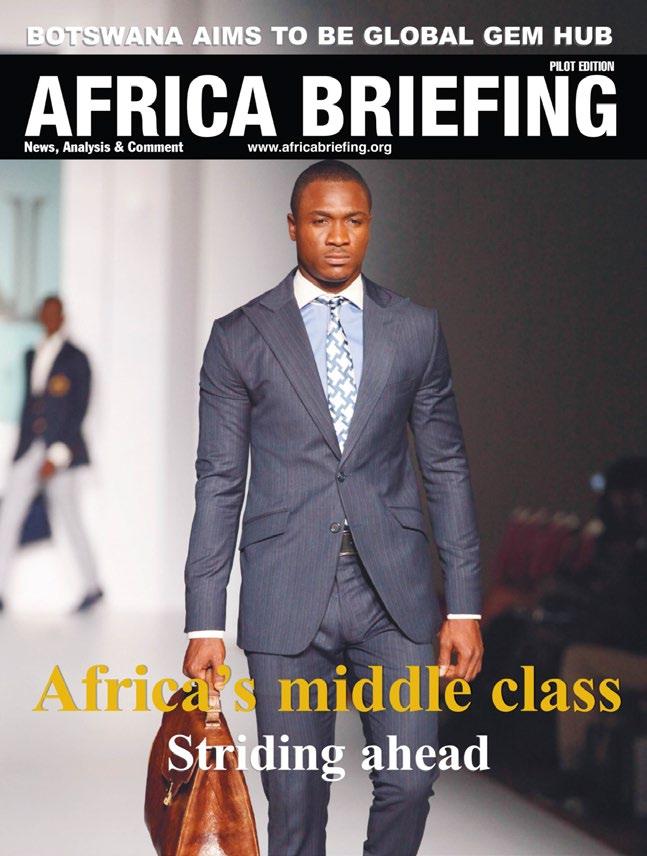
AFRICA’S debt will continue to be a headache in 2023 unless there is genuine co-operation between Africa’s lenders, transparency from its governments and prudence in managing public resources. The region’s debt is estimated to be around $636 billion – the equivalent of more than the combined GDP of over 40 Africa countries. Whilst this is only 11 percent of total global debt, servicing this debt comes at a price, with most governments having to deprioritise education and healthcare investment in an effort to cut costs and focus more on building revenue to catch up with existing debt loads. However, initiatives towards addressing Africa’s debt have not achieved results.
Africa has to borrow to finance its
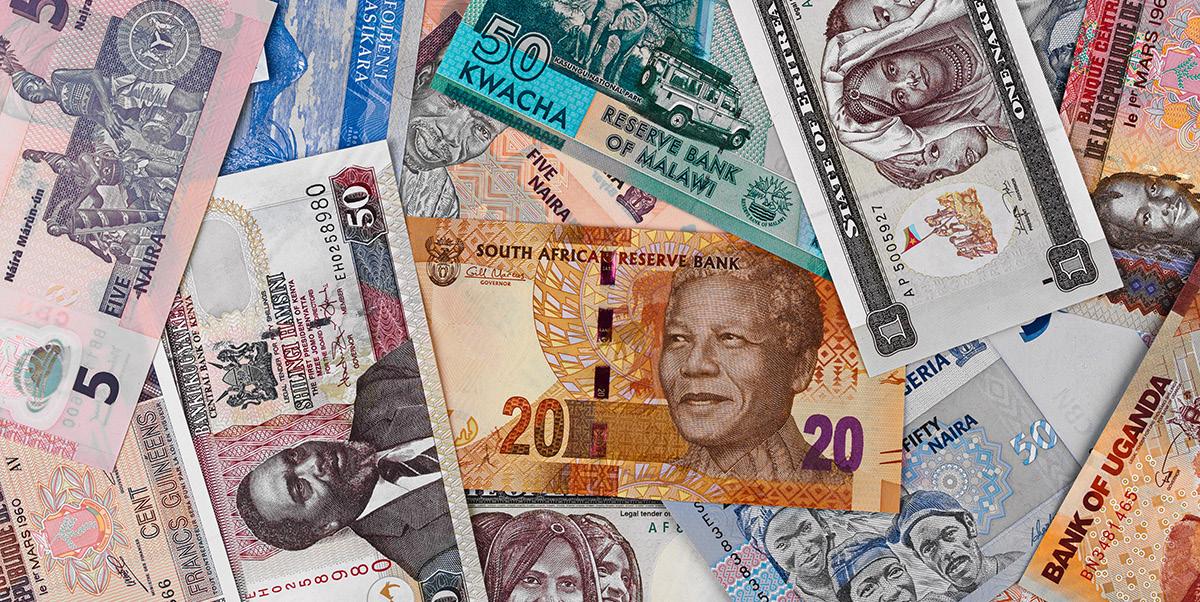
development programmes – but must do this responsibly. The continent needs to explore alternative sources of affordable capital – such as sharia compliant Islamic Finance, the new wave of impact investors and climate finance. And should work with stakeholders to reduce corruption and encourage domestic capital investment in the continent, particularly from local pension funds which manage more than $350 billion in assets. African countries should also leverage Diaspora remittances which have remained consistent over time and provide much-needed currency reserves for governments. These remittances last year stood at $53 billion, significantly in excess of development aid, but governments must do more to channel remittance beyond domestic use into
sustainable investments.
All regions across Africa face challenges and opportunities. Countries in the Eastern Africa region are experiencing high inflationary pressures. This is a result of a range of internal and external factors –including adverse weather conditions, high borrowing costs, conflicts and currency volatility and disruptions in the supply chains – and there is a strong likelihood that many of these factors will continue to affect growth prospects in 2023.
In Ethiopia, the implementation of the peace agreement between the Federal Government and the Tigray People’s Liberation Front (TPLF) is of critical importance and rebuilding the infrastructure of the Tigray region will be
2023 is likely to bring several challenges for the African region, but beyond the headlines of bad politics, Africans will continue with “business-as-usual” innovating and designing products that respond to the challenges, Agnes Gitau writes
an expensive undertaking for everyone.
Tensions persist along the eastern DRC border, providing opportunities for private geopolitical interests but misery for the region. People are being displaced en masse, even while artisanal mining and shady/illegal resource extractions continue apace under slave labour conditions. If this situation is not managed, escalation of the conflicts will affect millions of people and further disrupt business in the region. As a result of adverse weather conditions, the Horn of Africa will require urgent food supply to address the ongoing drought.
Kenya has an uphill task ahead, with early warnings over public debt which stands at 64.2 percent of GDP. In response, the new administration has rolled out an economic plan which aims to address some of the country’s challenges and promises to increase revenue collection, improve agriculture production by supporting farmers, encourage entrepreneurship by supporting the youth and SMEs to access affordable financing through an enterprise fund dubbed the “Hustlers” Fund.
Tanzania – a regional hopeful - has attracted investor confidence under the leadership of Samia Suluhu. Opportunities in the country’s infrastructure sector, the Uganda-Tanzania crude oil pipeline project and the natural gas projects, have received a nod from investors. And the recent announcement lifting a ban on political party rallies is a positive step in reaffirming the country’s political stability.
Mozambique, endowed with significant
Liquefied Natural Gas (LNG) reserves, will become an increasingly important country for energy investments and is hopeful of being able to benefit from and plug into the energy demand gap in Europe.
For South Africa, the 2024 national elections and the lead up through 2023 will be a critical area to watch. It is looking increasingly likely that the ANC will drop below the 50 percent mark in the election, ushering in a new era of coalition politics.
In West Africa, Nigeria’s economy is estimated to grow at 3.2 percent in 2023, with inflation expected to drop to 17 percent. However, the focus for most Nigerians will be on the February 2023 presidential election, where the battle to lead Nigeria is down to a three-man race led by Bola Tinubu of the incumbent All Progressives Congress (APC), Atiku Abubakar of the People’s Democratic Party (PDP) and Labour Party’s Peter Obi. Nigerians will go to the polls grappling with the same problems they have had for decades – an abundance of wealth and nothing to show for it. A decade ago, the APC under President Buhari vowed to transform the economy, invest in the country’s infrastructure, diversify the economy to wean it off its over dependence on crude oil and most importantly protect the lives of Nigerians from Boko Haram. The issue of insecurity still persists, from the insurgent-based conflict in the northeast, to socioeconomic instability in other parts of the country, and prevents real development from taking place. ChinaNigeria bilateral relations are also taking
a hit because insecurity is preventing the country from fully integrating with the BRI (Belt and Road Initiative).
The insurgency plaguing north-eastern Nigeria continues to spill into regional Sahel countries like Chad. Multinational task forces, in conjunction with foreign militaries, are working to confront the problem, but little success has been recorded and insurgent extremists seem to be becoming more brazen in their exploits.
Regional integration promises to transform Africa’s fortunes in line with the global Agenda 2030 and the continent’s vision 2063. The AfCFTA - one of the 15 flagship programmes of the Africa Union Agenda 2063 – is a blueprint and masterplan for transforming Africa into the global powerhouse of the future.
One of its main rationales is to drive Africa's industrialisation through trade. According to Prof. David Luke of the London School of Economics, the greatest promise of the AfCFTA is that the nature of the trade is composed of value-added goods. And so far, 65 percent of Africa's exports to other continents are extractives, while less than 35 percent of intra-African exports are extractives.
To make 2023 count for Africa, governments must prioritise the reduction of sovereign debt and strengthen financial stability, attract sustainable investment, improve the business environment for domestic and international investors, leverage diaspora remittances to create jobs, and address foreign reserves shortages.
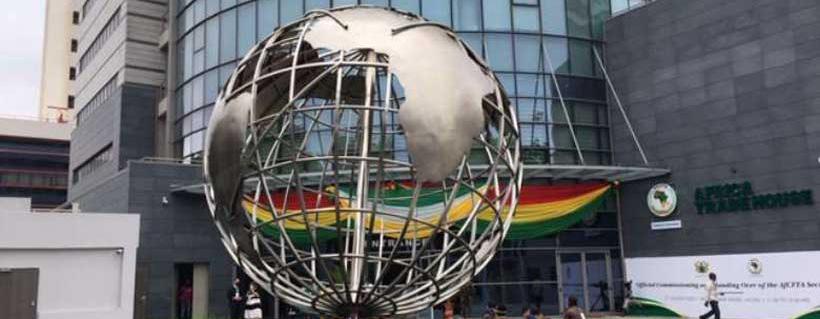
WHEN African leaders turned up in Washington in December for their meeting with the American President, Joe Biden, they were presented with an opportunity for more than 300 CEOs of US and African private sector businesses to come together to try to map out a way in which the continent and the US can benefit from the growth of Africa’s integration into global markets.
US Secretary of State Antony Blinken set the scene when he said: “Africa’s integration into global markets, demographic boom, and continent-wide spirit of entrepreneurship and innovation present an extraordinary opportunity for the United States to invest in Africa’s future. The United States will support and facilitate mobilising private capital to fuel economic growth, job creation, and greater US participation in Africa’s future.”
Of course, the robust intervention of China in Africa has focused the minds of American political and business leaders. How can they get a piece of the action from the extraordinary opportunities that African countries present?
China’s economic presence in Africa has rattled Africa’s traditional business partners. So, the Americans feel that they should respond by the way they know best: throw money on investment in Africa and trade with the continent with the youngest population on Earth.
As Blinken noted, since 2021 the US government has overseen over 800 twoway trade and investment deals across 47 African countries for a total estimated value of over $18 billion, while the US private sector has closed investment deals in Africa valued at $8.6 billion. US goods and services traded with Africa totalled $83.6 billion in 2021.
At the US-Africa Business Forum, Biden announced over $15 billion in twoway trade and investment commitments, deals, and partnerships that advance key

After the recent US-Africa Leaders Summit, Washington has committed to support private capital to fuel economic growth, job creation and deeper American economic cooperation with Africa. Africa Briefing looks at how this two-way trade and investment strategy will evolve
priorities, including sustainable energy, health systems, agribusiness, digital connectivity, infrastructure, and finance. Since January 2021, the Biden-Harris Administration has targeting more than $1 billion in trade, investment, and economic development in Africa.
The African Continental Free Trade Area (AfCFTA), which came into force in January 2021, is seen as a game-changer for Africa’s economic empowerment.

When it is fully operational it is envisioned that it will create a combined continentwide market of 1.3 billion people and $3.4 trillion, which would be the fifth-largest economy in the world.
Not surprisingly, during the Washington Summit, the US Trade Representative signed a Memorandum of Understanding with the AfCFTA Secretariat to support institutions to accelerate sustainable economic growth
across the continent, which would give the US an advantage in dealing with the continent. For a start, the US is funding a new Investment Adviser to the Secretariat of the AfCFTA, whose primary responsibility is to connect American companies with business opportunities in African nations.
Also, the US Agency for International Development (USAID) announced a range of commitments and newlyleveraged private investments across sectors, including in health, food security, and climate, and which promote gender equality, women’s economic empowerment, and social inclusion.
This includes $100 million to accelerate last-mile delivery of agricultural innovations and a pledge to unlock $300 million in private financing by increasing investment in infrastructure and manufacturing, as well as digital solutions to drive an effective AfCFTA). USAID also launched its Climate Action Infrastructure Facility that aims to leverage $100 million in private investment toward financing climate solutions.
On the banking front, the US ExportImport Bank currently has over $7 billion in exposure throughout Africa, including new authorisations such as $42 million in financing to Angola to buy GatesAir FM transmitters and $7.4 million in financing to Sapele Power Plc (Sapele) in Nigeria to buy American-manufactured energy storage systems from ESS Tech, Inc. At the Forum, EXIM signed several new MoUs, including, $500 million with the African Export-Import Bank (Afreximbank) to support diaspora engagement and strengthen EXIM’s commercial ties to the continent by increasing access to and awareness of EXIM financial products; $300 million with Africa 50 to facilitate up to $300 million in EXIM financing for the export of US goods and services to buyers throughout Africa, particularly in support of infrastructure, transportation, digital technology and renewable energy projects; and $500 million with the Africa Finance Corporation to facilitate US goods and services exports, promote US-Africa trade, and support financing of trade-enabling projects.
For a continent that has been struggling with poor power supply, America’s Power Africa has been involved on trying to reach more people with electricity. For instance, Power Africa has helped close 145 power generation investments valued at more
than $24 billion, and in collaboration with Prosper Africa, announced the launch of the Clean Tech Energy Network.
It is a collaboration between the US government and American clean tech energy companies, and African energy stakeholders that is expected to attract $350 million in deals.
During the Summit, the US Trade and Development Agency announced over 15 new activities designed to help unlock close to $1 billion in financing for Africa’s clean energy, digital, and healthcare infrastructure priorities and create more than $500 million in export opportunities for US firms. These new commitments build upon USTDA’s 30year history of partnering with Africa’s public and private sectors and financiers to shape infrastructure development across the continent. In 2022 alone, USTDA’s programme helped unlock more than $500 million in financing for 10 priority infrastructure projects across the continent.
Power Africa has put in place a $150 million public-private partnership to provide electricity to 10,000 health facilities in sub-Saharan Africa, bolstering sector resources to advance pandemic resilience and digital connectivity and decarbonise the health sector footprint.
There is also positive movement on
the African export front through Prosper Africa, which connects American and African businesses with new buyers, suppliers and investment opportunities. It has a budget of around $170 million to increase two-way trade and investment between the US and African countries
Prosper Africa expects to boost African exports to the US by $1 billion and raise an additional $1 billion in US investment in Africa. For example, it is launching five new partnerships with African investors that will leverage $200 million in private investment and generate millions of dollars in revenue for businesses, all while advancing African solutions to global challenges like climate change, food insecurity, and women’s empowerment.
“We’ll be investing more in rising African innovators. As Vice President Harris announced, we’re relaunching the African Women Entrepreneurship Programme, which will distribute grants to help African women entrepreneurs grow their businesses,” Blinken said at the business forum. “We know from experience that this can be a very powerful source of growth, a very powerful source of opportunity.”
Blinken was quite upbeat about the way the business forum went. He had clear-cut ideas of how the new economic arrangement between the US and Africa
should progress.
He told the business leaders: “Together, as the world’s largest economy and one of the world’s fastest-growing economic regions, respectively, the United States and African nations have the potential to build one of the 21st century’s most successful economic partnerships.
“If we manage to increase our share of imports and exports by just one per cent, we would generate an additional $34 billion in revenue for Africa, $25 billion in revenue for the United States – and create more than 250,000 good-paying jobs as a result.”
He said when he was in South Africa last year, he had the opportunity to set out the US government’s new strategy for sub-Saharan Africa. “And at its heart, it’s a strategy that’s focused on one word, and that’s ‘partnership.’
“Our approach is rooted in the recognition that to meaningfully address our shared challenges, we need the leadership, we need the innovation of African nations and institutions working side by side, as equal partners, with American institutions, with our government, with our private sector. And we’re committed to this collaborative approach in our work with African businesses, too.”
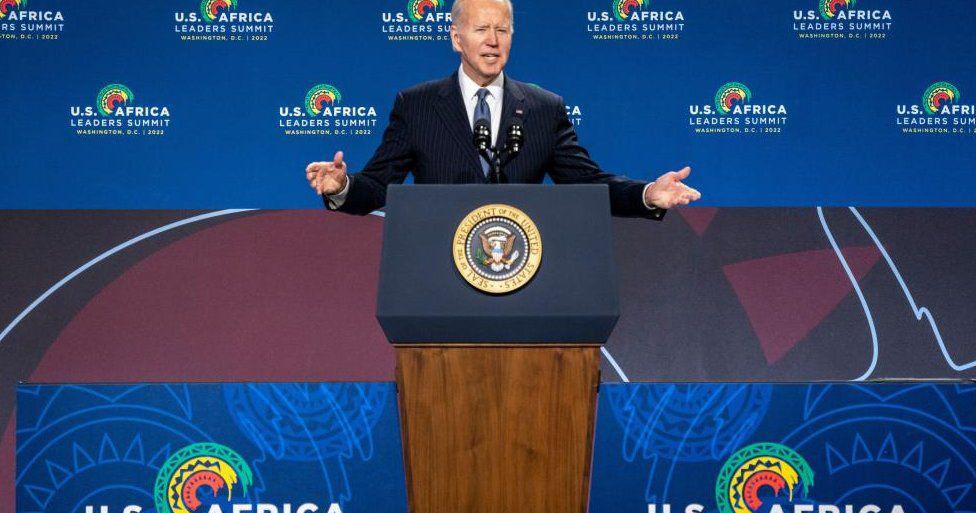
THE transformation of the European energy strategy away from dependence on Russian fossil fuels represents an opportunity for Africa’s gas producers. However, there are also risks involved.
Citing force majeure – the effects of floods on production and distribution operations – Nigeria LNG has recently announced that it would not be able to meet the demands of a supply contract with Portugal’s Galp, a multinational energy giant. Galp, in turn, has turned to Algeria to fill the void, importing gas through the

Medgaz pipeline. This episode illustrates the challenges associated with the emerging energy landscape, characterized by deals that entail extensive market, operational, political and geopolitical risks.
Recent changes also expose Europe’s fragilities and inconsistencies. Brussels has been forced to make a U-turn in its rhetoric and practice, moving away from the green evangelism policy that adversely impacted oil and gas producers in Africa. Ironically, those countries are now an important part of Europe’s attempts to overcome an energy crisis that, amid inflation and
recession, is profoundly affecting the livelihoods of Europeans.
The number of energy deals signed by the European Union and by European states with third countries has substantially increased, and diversification is a priority. Outside Europe, the United States has consolidated its position as a critical supplier of liquefied natural gas (LNG), with exports to the EU growing rapidly. This dependency, however, may further compromise transatlantic relations as a trade war between Brussels and Washington over green subsidies becomes
As Europe shuns Russian energy supplies, Africa is poised to increase its oil and natural gas exports to the continent, writes Teresa Nogueira Pinto
a possibility.
Russia’s war on Ukraine has forced Brussels to reverse its zealous climate policies, with direct and positive implications for African producers. Natural gas has been labelled a “transitional fuel” and, according to the European Parliament, new investments in gas – until recently disincentivized by European banks – are now considered “climate-friendly.” While the environmental consequences of gas production and processing have not changed in recent months, the economic crisis triggered by the war came as a reality check.
In Africa, where most countries face daunting challenges, this shift has been met with cautious optimism. African political leaders and stakeholders in the energy sector had severely criticized Brussel’s green zealousness, denouncing Western hypocrisy on the matter. In a clear sign of the growing agency of African countries, the African Energy Transition Bank was created to find alternative and much-needed capital to develop oil and gas projects across the continent.
Now, Africa accounts for around 20 percent of Europe’s gas imports, a share that is likely to increase. However, while the continent has significant potential,
there are vast differences in exploitation, processing and exporting capacity.
Countries like Tanzania and the Democratic Republic of the Congo (DRC) have proven reserves but lack the necessary infrastructure. Others, like Mozambique or Mauritania, also have significant proven reserves and gas export capacity under construction, although they still need to be operational. In this context, the most significant potential lies with established exporters, i.e., countries with available gas export facilities, like Nigeria, Algeria, Egypt, Cameroon, Angola, Equatorial Guinea or the DRC.
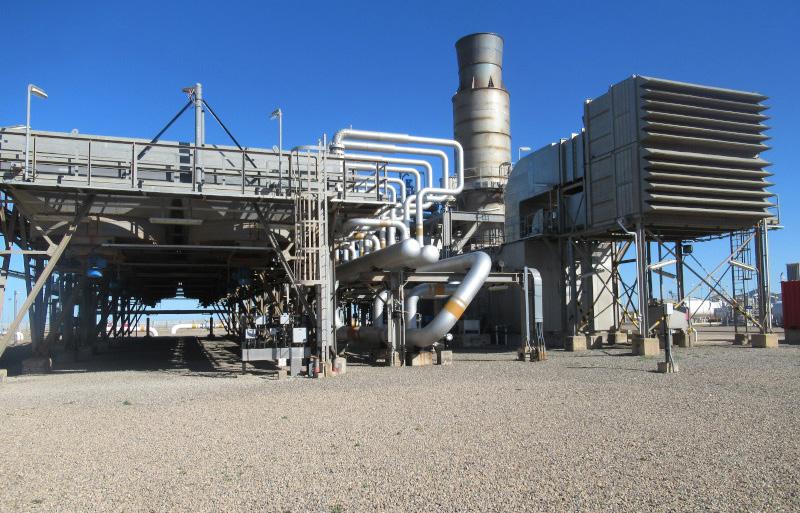
Considering the existing infrastructure – pipelines connecting to the European gas network – and recent deals, Algeria, Egypt, Angola and Nigeria are particularly wellpositioned to increase exports to Europe and benefit from this momentum.
The current context may evolve into a win-win situation whereby European countries diversify their gas suppliers while African countries attract much-needed investment, increasing production and meeting domestic and external demand. The materialization of this best-case scenario, however, is challenged by several factors, including market risks, economic difficulties and geopolitical uncertainty.
The case of Nigeria is illustrative. Besides being a major oil producer, Nigeria also has Africa’s largest proven natural gas reserves (the 10th largest in the world) and vast renewable potential, most notably in solar energy. Not surprisingly, the country played an important role in China’s “Go Out” strategy. In 2019, when European banks were banning investments in oil and gas, Beijing’s investments in Nigeria’s energy sector reached $16 billion.
China’s footprint includes ownership and development of oil blocks, biofuel production and through the Belt and Road Initiative, the financing of major infrastructure projects, including transnational highways, high-speed railway systems and deepwater seaports.
Nigeria’s energy security and prospects as a gas exporter are now tied to the development of three major infrastructure projects, the Ajaokuta-Kaduna-Kano pipeline (AKK), the Trans-Saharan Gas Pipeline (TSGP), linking West Africa to Europe and the Nigeria-Morocco Gas Pipeline (NMGP). These projects have recently received renewed attention, given Europe’s new energy strategy.
The AKK is a three-phase project to build a 614-kilometre pipeline, estimated to cost $2.8 billion and destined to transport
gas from the Ajaokuta terminal gas station, in central Nigeria, to the city of Kano, in the northwest. The TSGP, in turn, first conceived in the 1970s, has been delayed several times since. Niger joined the project in 2008, and the TSGP is now intended to link the Niger Delta region through Nigeria to Algeria and then into Europe. The 4,128-kilometer pipeline is expected to transport 30 billion cubic meters of gas annually. The NMGP, which Morocco is promoting, is still in its initial stage.
All these projects, oriented toward increasing production, processing and distribution capacity, are required to materialize a win-win scenario for African and European countries. However, they are capital-intensive and carry high risks that go beyond market uncertainty. A quick analysis of the oil system provides some warnings. Nigeria has once more failed to meet its APEC oil production quota. And while structural challenges, including old infrastructure and lack of investment, are part of the problem, oil theft and corruption also explain this outcome.
Currently, the Nigerian Gas Processing and Transportation Limited (NGPTC), a subsidiary of the Nigerian National Petroleum Corporation (NNPC) which manages most pipelines in the country, is involved in a legal battle with Glencore over corruption allegations.
Another uncertainty driver that may delay investment decisions is the upcoming presidential elections scheduled for February 23, 2023, which will determine who succeeds President Muhammadu Buhari.
Even if elections are expected to occur without significant snags, risks will remain high after the power transfer. Whoever succeeds President Buhari will be faced with a herculean task. Debt servicing consumes 90 percent of the government’s revenue, unemployment is estimated at 35 percent and inflation has reached 15 percent. Communal violence and banditry have increased across the country due to chronic poverty, scarce resources (arable land and water) and state fragility.
The exploitation of resources also tends to increase tensions. Between 2004 and 2014, operations in the hydrocarbonsrich Niger Delta region were disrupted by militants of the Movement for the
Emancipation of the Niger Delta (MEND), who resorted to oil theft, the damaging of pipelines and technician kidnapping. Ironically, these groups are presently competing for contracts to protect infrastructure from rampant oil theft.
The completion and operationalization of the TSGP and MNGP, necessary to connect Nigerian gas to European markets, is also threatened by regional trends. The Sahel region is now a confluence of terrorist movements, organized crime groups, banditry and communal violence. Algeria, which accounts for around 8 percent of the European gas imports, is Nigeria’s leading partner in the TSGP. And like in Nigeria, old infrastructure, capital scarcity and a factionalised and predatory ruling elite are why, despite its potential, Algeria struggles to respond to rising international and domestic demand, expected to increase by 50 percent by 2028.
But there are other reasons why decisionmakers should see Algeria as a cautionary tale. In June, Algiers suspended the cooperation treaty with Madrid and reduced gas exports over tensions relating to the Western Sahara dispute. That happened after a rapprochement between Spain and Morocco, which, in turn, must be understood considering Morocco’s relevance in the containment of irregular migration flows into Spain. These events demonstrate that states will weaponize their strategic advantages to secure their interests whenever necessary.
Europe’s rush for African gas entails both risks and opportunities for all actors involved. While African countries will not be able to replace Russian supplies, it is possible to reach a win-win situation under which gas producers attain significant economic gains and European countries diversify their pool of suppliers and routes.
As several analysts warn, Europe may return to its strategy of banning fossil fuels in the medium term. But even under this scenario, established African producers like Nigeria may benefit from current deals, as they provide much-needed capital to increase production, processing and transport capacities. These, in turn, will be determinants to meet rising levels of domestic demand in countries where energy insecurity remains an obstacle to growth and development in a continent
where 600 million people do not have access to electricity.
In Nigeria’s case, this win-win situation could be compromised by two factors. The first is that amid a volatile international context, investors and decision-makers may refrain from entering the continent into long-term, high-risk and capital-intensive energy ventures. That means that the political will and financial commitment of the African countries involved in the TSGP will be critical. The second factor is paradoxical. Even under this scenario – the project is completed, foreign currency earnings grow, and investment generates employment – higher gas rents could contribute to perpetuating predatory politics, and shield regimes from popular pressure, thus delaying muchneeded political and economic reforms.
However, from a regional perspective and considering the new push for trade and economic integration and the continent’s demographic prospects, all infrastructural advances, if well implemented, would have multiplying effects on a regional scale. And given that Africa holds around 13 percent of the world’s reserves, gas is expected to become a relevant energy source, paving the way for a sustainable transition without risking much-needed economic growth.
While Europe’s long-term goal is energy self-sufficiency, that will not happen soon, even under a best-case scenario. But Europe’s strategy based on significant dependence on gas from countries like Nigeria or Algeria and on delivery routes crossing the Sahel is unlikely, given the market and geopolitical risks. In the medium term, it could lead to clashes with China, an important creditor with a firm foothold in these countries’ energy sectors. In a scenario of tensions, Beijing could use its advantages against European interests.
An increasing footprint in Africa’s gas sector would also expose Europe to criticism regarding its double standards in Africa. As in the case of migration, which tested Brussels’ claims on aid conditionality, democracy and human rights, the current energy crisis has exposed the limits of the EU’s green evangelism, which until recently severely affected oil and gas producers in Africa. Given that Europe relies on soft power, such critiques could reduce its clout.
Teresa Nogueira Pinto is an African affairs expert. She earned her PhD in global studies from the department of social and human sciences at Nova University in Lisbon with a thesis entitled “Presidents for Life in Sub-Saharan Africa: The Cases of Zimbabwe and Rwanda.” She writes for the gisreportsonline.com
TANZANIA has an active strategy to compete with Kenya for market share in the Indian Ocean ports sector. The Port of Dar es Salaam is offering faster and more cost-effective trade and transport solutions than Kilindini Harbour in Mombasa, since Dar es Salaam is benefitting from ongoing expansion and investments. Plans for a new deep-water facility to be built by Chinese contractors at Bagamoyo are being revitalised, although there remain serious environmental, social, and governance (ESG) concerns.
Dar es Salaam – offering alternatives for regional trade to the Port of Mombasa

The Port of Dar es Salaam is one of three ocean ports in the country and handles over 90 percent of the country's cargo traffic. Although it is smaller than Durban and Maputo, Dar es Salaam is fast catching up on the market share of the Port of Mombasa for Indian Ocean commerce and trade. Landlocked countries like the Democratic Republic of Congo, Malawi, Uganda, Zambia, Rwanda, and Zimbabwe are increasingly choosing Dar es Salaam over Mombasa, due to the latter’s congestion problems. As such, Dar es Salaam is becoming a regional transhipment hub for soft commodity exports, such as tea, coffee, tobacco,
oilseeds, cotton, sisal, and cashew nuts, as well as metals like copper.
Dar es Salaam port is designed to handle more than 10 million tonnes of cargo annually including nearly 4 million tonnes of dry general cargo, 6 million tonnes of liquid bulk, and 1 million tonnes of containers. An expansion programme is ongoing and will cost at least $421 million. The port’s operator, the Tanzania Ports Authority (TPA), has a similar mandate as its Kenyan equivalent, the KPA.
Beyond Dar es Salaam, there are two more major seaports in the country, namely Tanga and Mtwara. Tanga is the second biggest port in the country with present
In the final part of a report on East African ports, boutique business advisory firm GBS Africa looks at Tanzania’s race to challenge Kenya’s ports market share and Mozambique’s gas-fuelled economic boom driving shipping demand
annual cargo capacity of 1.2 million tonnes and is linked to Dar es Salaam port through a 350-kilometre highway. Tanga serves the north of Tanzania, as well as neighbouring nations of Burundi, Rwanda, and northern Uganda, with exports including coffee, cement, tea, beans, timber, animal hides, sisal, and fertilisers. import commodities are phosphates, chemicals, construction equipment, automobiles, ammonia, oil,
Since 2021, Tanzania’s President Samia Suluhu Hassan has reopened negotiations with China Merchant Holdings (CMH) to build a $10 billion new port, 75 kilometres north of Dar es Salaam at Bagamoyo. The president’s predecessor cancelled the project over three years ago, in June 2019, claiming then that the financing terms presented by Hong Kong-based CMH were ‘exploitative and awkward.’ Bagamoyo Port, financed by China and Oman’s sovereign wealth fund, would have become the largest port in East Africa as a 20 million TEU (20ft-equivalent unit)
sulphur, grains, and cereals.
Mtwara is the third major deep-water port of Tanzania located in the southern part of the country, from where it also serves Malawi, Mozambique, and eastern Zambia. Mtwara deals with general cargo and is known for exporting cashew nuts, cassava roots, and sisal. It receives shipments of foodstuff, raw material, and cement. An industrial zone is planned
container port. The Bagamoyo project was also a major connectivity initiative being pursued by China in East Africa under its Belt and Road Initiative (BRI) programme. The project included construction of several rail lines and roads to oil fields.
Tanzania has been trying to change conditions such as a guarantee of compensation for any losses incurred during project implementation, as well as to revoke tax waivers granted to the Chinese companies, including waivers of a land tax, workers’ compensation tax, a skills development levy, a customs duty, and value added tax. The World Bank and several experts have criticised the Bagamoyo construction
to be constructed near Mtwara, which should increase capacity uptake at the port. Overall, the TPA offers sound management of these port facilities, although many ports run below their designed capacity.
Additionally, there is a port in Zanzibar, which provides ferry services but does not provide access for large cargo vessels. Mwanza is the main port facility on Lake Victoria, but is smaller than Kisumu in Kenya.
plans, saying that the port project would not be commercially sustainable under its current structure, but could attract business if developed as a regional maritime initiative by the East African Community.
Expert reports say that the port would be too large for its envisaged role and that it is located too close to other major regional ports, like Dar es Salaam and Mtwara in Tanzania, and Lamu and Mombasa in Kenya, which all compete for the same regional cargo business. The renegotiation of the Bagamoyo port project by Tanzania is therefore aimed at extracting improved terms for the country, while also seeking a more sustainable commercial agreement that will allow competition with other ports.
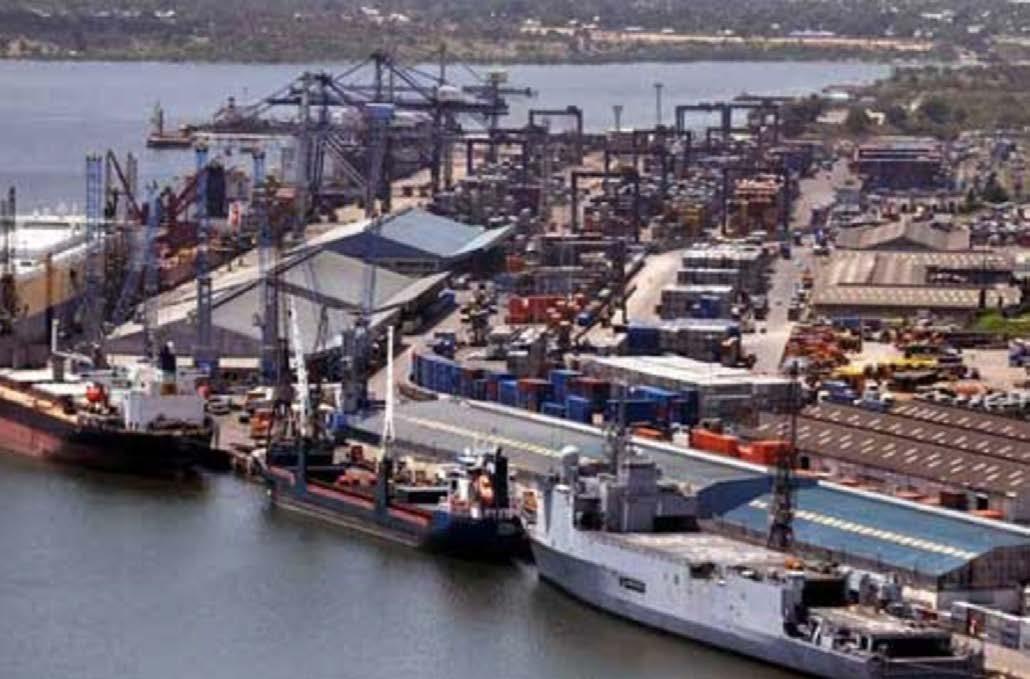
Mozambique’s gas-fuelled economic boom drives shipping demand
Mozambique’s five main seaports are all undergoing expansion and rehabilitation as demand for shipping increases in the southern African region. Maputo port’s operations are managed by a highly successful joint venture between the local government, and South African and UAE companies.
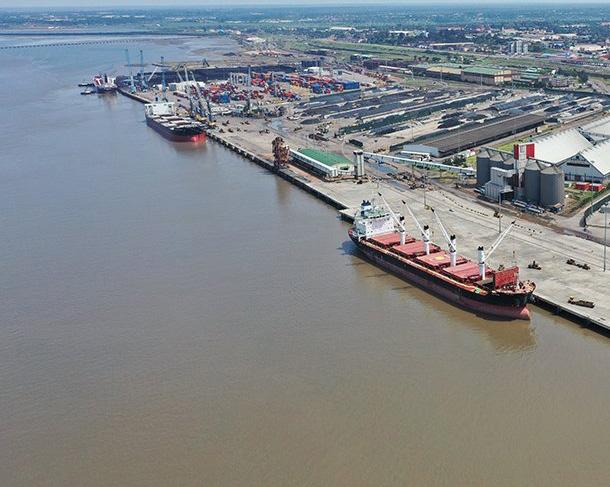
Since 2003, the Port of Maputo has been operated by a public-private joint venture, the Maputo Port Development Company (MPDC), which is a partnership between state-owned Mozambican Railway Company (Caminhos de Ferro de
Moçambique) and Portus Indico, which comprises Grindrod, DP World and local company Mozambique Gestores. DP World has since further invested in the company and its concession. MPDC holds the rights to finance, rehabilitate, construct, operate, manage, maintain, develop, and optimise the entire concession area. The company also holds the powers of a Port Authority, being responsible for maritime operations, piloting towing (tugboats), stevedoring, terminal, and warehouse operations, as well as port’s planning development.
Due to MPDC’s sound management, the port of Maputo has favourable loading rates and efficient services, which have
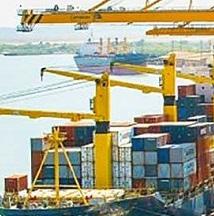
made it an attractive facility for charterers and shipping companies. In 2021, Maputo Port achieved a new record as it registered a 21 per cent growth compared to 2020. The total volume of cargo handled in 2021 stood at 22.2 million tonnes versus the 18.3 million tonnes of the previous year. With a capacity to handle 100,000 TEU annually, the container facility is one of the busiest in southern Africa.

Thanks to the port, Maputo’s economy is based on numerous industries like shipbuilding, breweries, ironworks, cement, and textiles whose finished products are also exported from this port. Matola Terminal is a separate deep-water facility that serves oil tankers and ore carriers. The aluminium wharf can handle one million tonnes of bulk alumina, petroleum coke and pitch annually. Moreover, the coal terminally handles 2.5 million tons of bulk mineral coal annually.
Mozambique’s other ports – facility expansion and refurbishments underway

Mozambique has four more notable seaports, including Beira, Nacala, Quelimane, and Pemba. The Port of Beira is the second largest port in Mozambique and is a major facility for shipping central African goods and serves as a transhipment port for the inland countries of Zimbabwe, Malawi, and Zambia. Beira’s container handling facility is one of the most technologically advanced in the South African region. Meanwhile, the Port of Nacala handles most of the international trade of landlocked Malawi and is visited by over 200 ships annually. Nacala’s port is operated by Sociedade do Corredor Logístico Integrado do Norte (CLIN), which is a joint venture between Brazil’s Vale and CFM.
The two other ports, Quelimane and Pemba, are smaller facilities, serving the northern provinces of Mozambique, although Pemba is increasingly becoming a hub for the nascent natural gas sector. The government and CFM have extensive plans to expand these facilities, as well as other ports across Mozambique, as the country’s economy is set to grow at record pace in coming years due to the natural gas boom.

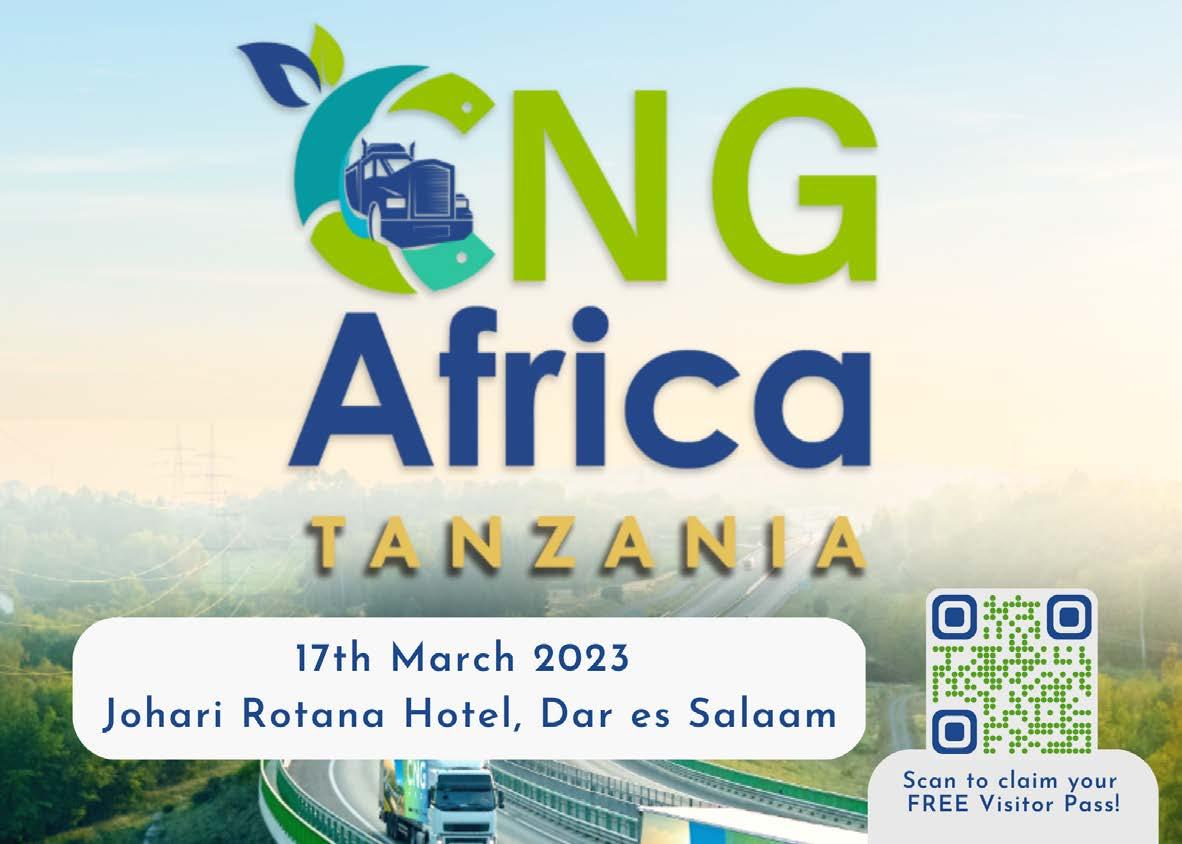
Biafra in the News: The Nigerian Civil War Seen from a London News Desk, by Jonathan Derrick; Hurst, £19.99 paperback
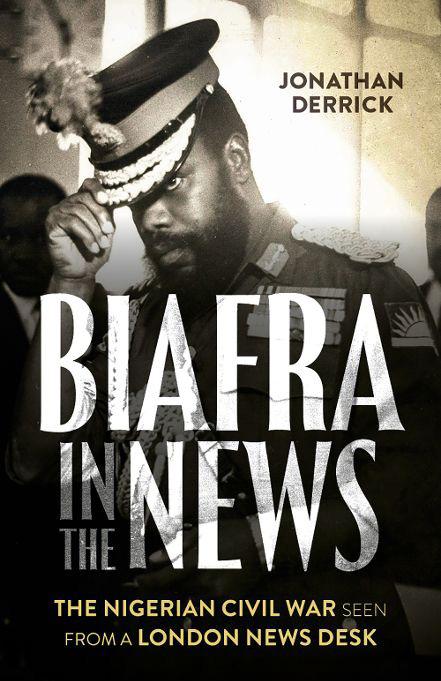
IT is over 50 years since the Nigerian military finally ended the 30-month secession of Biafra in the East of the country. But the agitation for an independent Biafra has continued sporadically during this period.
The latest manifestation of this is the Indigenous People of Biafra (IPOB) separatist group spearheaded by Nnamdi Kanu. He is languishing in detention after the Federal government proscribed the organisation.
Derrick’s book was supposed to have been out in 2020 to coincide with the 50th anniversary of the capitulation of Biafra on January 15, 1970. But the pandemic caused publication to be delayed.
Given the volatile situation over IPOB and Igbo independence aspirations, Derrick is quick to point out that he is not taking sides. Just like the London-based West Africa magazine of old, for which Derrick was the journalist recording the Nigerian Civil War, he has stuck to the publication’s editorial policy of reporting and analysing the conflict as it happened.
Of course, when there is a need to move from the narrative – especially on controversial subjects – the author has attempted to give an updated assessment. For instance, the famine in Biafra was a tragedy of great proportions and the global reaction was overwhelming.
Derrick was well-placed to observe “the worldwide popular sympathy for Biafran war victims; the relief airlift to Biafran territory; and the propaganda by the warring parties and their foreign supporters”.
He notes: “On all these topics that have aroused heated debate, subsequent writing has added little of significance to the facts known to us at West Africa at the time: this book has no major revelations.”
This notwithstanding, Biafra in the News is worth reading. For one thing it will inform many who have no knowledge of the conflict and are just jumping on any passing Biafra bandwagon without first ascertaining which direction it is heading.
For another, the book will reawaken the full impact of the conflict for those who went through it or who regularly bought West Africa magazine to get the latest information on the war.
In the days before the internet and the era of pervasive communication, West Africa was a publication of record that academics and students turned to for their research on the politics and socio-economic life of the West African region. The magazine followed events meticulously through local correspondents and staff journalists who visited the region.
Coverage of the Nigerian Civil War was in the hands of Derrick who put together excellent pieces on the conflict while he was at West Africa magazine from April 1966 to August 1970. This period was the height of political turbulence in Nigeria that saw the country’s first coup and then the Biafra war.
Although Derrick never visited the war zone, he later spent six years in Nigeria at Ahmadu Bello University and the University of Ilorin. During this time, he says he got to know the country better, visiting parts of it, including the Biafran zone.
The issue of Biafra still rankles among many in Igboland. In other restive parts of Nigeria, would-be separatist groups are closely monitoring the rumblings of discontent coming from IPOB.
Derrick is clearly aware of these. “Nigerians with strong retrospective partisan feelings for either side in the war will disagree with some of my judgements. I never had any grudges against anyone I encountered in Nigeria, or its government at the time – there is nothing personal behind what I have written.”
Nevertheless, there is a warning of foreboding for would-be secessionists. Derrick rightly points out that post-colonial African countries seldom split. And the two wars of secession that succeeded – Eritrea from Ethiopia, and South Sudan from Sudan – have not produced encouraging results.
These secessionists war began long before the Nigerian Civil War. Derrick notes: “The suffering in those wars exceeded even that in the Biafran war, and eventually neither Eritrea nor South Sudan provided a good advertisement for secession in Africa: in Eritrea a harsh authoritarian regime fought a crazed war with Ethiopia over valueless territory (1998-2000); and in South Sudan, armed factions tore the country apart just as it finally got independence after decades of war.”
Derrick did two stints at West Africa magazine. The second was in the late 1990s during my 10 years (1993-2003) at the publication, two of which I was Editor. Derrick was a diligent sub-editor who clearly knew what the magazine’s ardent readers were looking for.
He is author Africa’s ‘Agitators’: Militant Anti-Colonialism in Africa and the West, 1918-1939; and Africa, Empire and Fleet Street, which looked at the history of West Africa magazine from its founding in 1917 to 1947. Both books were published by Hurst
Thus, those who want to understand the nature of Biafran agitation today would do well to get a copy of Biafra in the News to draw from the raw material of history to help them along the way.
Desmond Davies